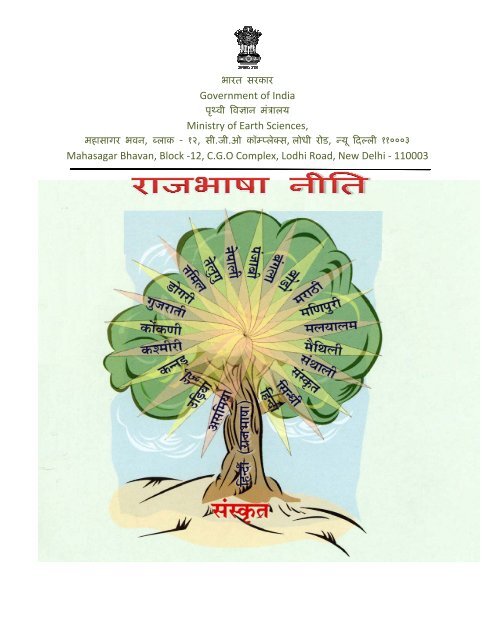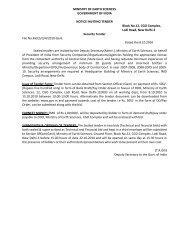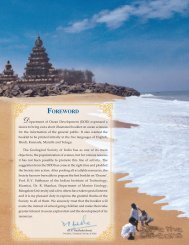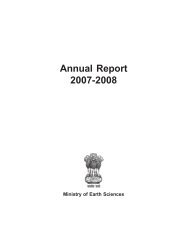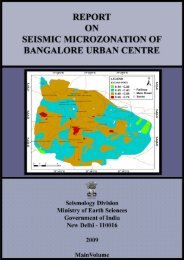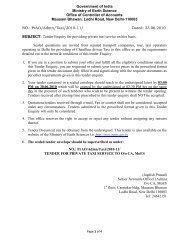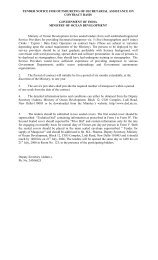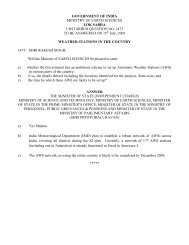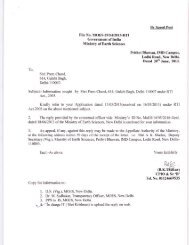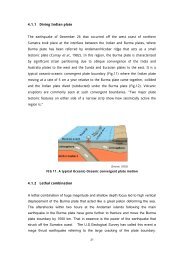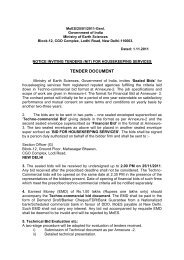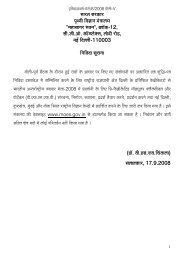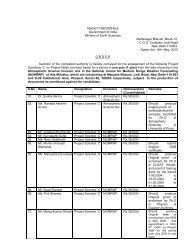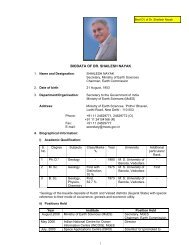Rajbhasha Niti - Ministry Of Earth Sciences
Rajbhasha Niti - Ministry Of Earth Sciences
Rajbhasha Niti - Ministry Of Earth Sciences
- No tags were found...
You also want an ePaper? Increase the reach of your titles
YUMPU automatically turns print PDFs into web optimized ePapers that Google loves.
िवषय सूचीCONTENTS.सं.S.No.िवषयSUBJECTपृ ठ सं.PAGE NO.1. राजभाषा संबंधी संवैधािनक उपबंध1CONSTITUTIONAL PROVISIONS REGARDING OFFICIALLANGUAGE2. राजभाषा अिधिनयम 1963 (यथा संशोिधत 1967)6THE OFFICIAL LANGUAGE 1963(AS AMENDED 1967)3. राजभाषा संक प,196810THE OFFICIAL LANGUAGE RESOLUTION,19684. राजभाषा िनयम, 1976 (यथा संशोिधत 1987)12THE OFFICIAL LANGUAGES RULES 1976 (AS AMENDED1987)5. कायालय म आम तौर पर योग होने वाले वाक् य/वाक् यांश औरट पिणय17SOME EXPRESSIONS, PHRASES AND NOTINGS COMMONLYUSED IN OFFICES6. अंेजी से िभ न भाषा के सामा य युक् त पद/श द27COMMON PHRASES OF OTHER THAN THE ENGLISHLANGUAGE USED IN CORRESPODENCE7. राजभाषा अिधिनयम क धारा 3 (3) के अंतगत जारी कए जाने वालेिभाषी कागजात28DOCUMENTS TO BE ISSUED BILINGUALLY ACCORDINGTO SECTION 3(3) OF THE OFFICIAL LANGUAGE ACT.8. राजभाषा िनयम 1976 (यथासंशोिधत 1987)के अनुसार 'क' 'ख' और'ग' े का िववरणDETAILS OF 'A' 'B' & 'C' REGIONS IN ACCORDANCE WITHTHE OFFICIAL LANGUAGE RULES 1976(AS AMENDED 1987)9. दैिनक उपयोग के मानक पSTANDARD PROFORMA OF DAILY USE2930
dtqrtrg * q-{rff ft-rrtr fr trs1-a *< rHftft + AT fr €€ x.rft mr lrf.EWffr.rEm tdr t dsn q{fqffi qs rrrR +'r erfts si.r t I rr{ etrEqqfi t fr frf$ser{Ti?IF{ +,rfr h ftq frfrn FIT{ A *{ Eq qmt t fr qtfud ftiq qq 3Iq-fr$irqr h qrcqq fr e6"rdr t m qmt t Ifrq h arrrrrq {T$fffitr!rci'trFrseflq uq frwm \n* ilfi-ft-fr *T d'Fr{ f,-tt h frq BTTfi qrrff 6'r rfrnr 6tt t | 3rff: ri=rrqTq h ffi-+, s5q }ffi{ qf errfi ?Tra{T ff q{trr fr vq?t gq zr{ er?t{+fi't ft q* T{rffiqir rr{itq'q6Tfr qf sfr trqrfr'rns"r{T h sq t 3l-ffirt h ftq
CONSTITUTIONAL PROVISIONS REGARDING OFFICIAL LANGUAGEDetails of various provisions regarding propagation and implementation of <strong>Of</strong>ficial languagepolicy in the part v (120), part v* (210) and xv** of the Constitution of india are reproduced asfollows :-OFFICIAL LANGUAGE POLICY OF THE UNIONConstitution of india part v (120), part v* (210) and part xv**part vLanguage to be used in Parliament120. (1) Notwithstanding anything in Part xv**, but subject to the provision of article 348,business in Parliament shall be transacted in Hindi or in English:Provided that the Chairman of the Council of States or Speaker of the House of the People, orperson acting as such, as the case may be, may permit any member who can not adequately expresshimself in Hindi or in English to address the House in his mother tongue.(2) Unless Parliament by law otherwise provides, this article shall after the expiration of a periodof fifteen years from the commencement of this Constitution, have effect as if the words "or in English"were omitted therefrom.Part V*Language to be used in the Legislature210. (1) Notwithstanding anything in part xv**, but subject to the provisions of article 348,business in the Legislature of a State shall be transacted in the <strong>Of</strong>ficial Language or Languages of theState or in Hindi or in English:Provided that the Speaker of the Legislative Assembly or Chairman of the Legislative Council, orperson acting as such, as the case may be, may permit any member who cannot adequately expresshimself in any of the languages aforesaid to address in the House in his mother-tongue. (This article isnot applicable to Jammu & Kashmir).(2) Unless the Legislature of the State by law otherwise provides, this article shall, after theexpiration of a period of fifteen years from the commencement of this Constitution, have effect as if thewords "or in English " were omitted therefrom:........2/-
®ÉVÉ£ÉÉÞÉÉ ºÉƤÉÆvÉÉÒ ºÉÆ´ÉèvÉÉÉÊxÉBÉE ={ɤÉÆvÉ£ÉÉ®iÉ BÉEä ºÉÆÉÊ´ÉvÉÉxÉ BÉEä £ÉÉMÉ-5 (120), £ÉÉMÉ 6 (210) +ÉÉè® £ÉÉMÉ 17 BÉEäÉÊ´ÉÉÊ£ÉxxÉ ={ɤÉÆvÉÉå àÉå ®ÉVÉ£ÉÉÞÉÉ BÉEä |ÉSÉÉ®-|ɺÉÉ® A´ÉÆ BÉEɪÉÉÇx´ÉªÉxÉ BÉEä ÉÊãÉA|ÉÉ´ÉvÉÉxÉ ÉÊBÉEªÉÉ MɪÉÉ cè, =xÉBÉEÉ ÉÊ´É´É®hÉ ªÉcÉÄ ÉÊnªÉÉ MɪÉÉ cè&-ºÉÆPÉ BÉEÉÒ ®ÉVÉ£ÉÉÞÉÉ xÉÉÒÉÊiÉ£ÉÉ®iÉ BÉEÉ ºÉÆÉÊ´ÉvÉÉxÉ- £ÉÉMÉ 5 (120) , £ÉÉMÉ 6 (210) +ÉÉè® £ÉÉMÉ 17£ÉÉMÉ 5ºÉƺÉn àÉå |ɪÉÖBÉDiÉ cÉäxÉä ´ÉÉãÉÉÒ £ÉÉÞÉÉ120(*) £ÉÉMÉ 17 àÉå ÉÊBÉEºÉÉÒ ¤ÉÉiÉ BÉEä cÉäiÉä cÖA £ÉÉÒ, ÉÊBÉExiÉÖ +ÉxÉÖSUän 348 BÉEä ={ɤÉÆvÉÉå BÉEä +ÉvÉÉÒxÉ ®ciÉä cÖA ºÉƺÉn àÉåBÉEɪÉÇ ÉÊcÆnÉÒ àÉå ªÉÉ +ÉÆOÉäVÉÉÒ àÉå ÉÊBÉEªÉÉ VÉÉAMÉÉ &{É®xiÉÖ, ªÉlÉÉÉʺlÉÉÊiÉ, ®ÉVªÉºÉ£ÉÉ BÉEÉ ºÉ£ÉÉ{ÉÉÊiÉ ªÉÉ ãÉÉäBÉE-ºÉ£ÉÉ BÉEÉ +ÉvªÉFÉ +ÉlÉ´ÉÉ AäºÉä °ó{É àÉå BÉEɪÉÇ BÉE®xÉä ´ÉÉãÉÉBªÉÉÊBÉDiÉ ÉÊBÉEºÉÉÒ ºÉnºªÉ BÉEÉä VÉÉä ÉÊcÆnÉÒ ªÉÉ +ÉÆOÉäVÉÉÒ àÉå +É{ÉxÉÉÒ {ɪÉÉÇ{iÉ +ÉÉÊ£ÉBªÉÉÊBÉDiÉ xÉcÉÓ BÉE® ºÉBÉEiÉÉ, +É{ÉxÉÉÒ àÉÉiÉ£ÉÉÞÉÉ àÉå ºÉnxÉBÉEÉä ºÉƤÉÉäÉÊvÉiÉ BÉE®xÉä BÉEÉÒ +ÉxÉÖYÉÉ nä ºÉBÉEäMÉÉ *(2) VÉ¤É iÉBÉE ºÉƺÉn ÉÊ´ÉÉÊvÉ uÉ®É +ÉxªÉlÉÉ ={ɤÉÆvÉ xÉ BÉE®ä iÉ¤É iÉBÉE
2"Provided that in relation to the Legislatures of the States of Himachal Pradesh, Manipur,Meghalaya and Tripura this clause shall have effect as if for the words "fifteen years" occurring therein,the words "twenty five years" were substituted."part xv****Language of Union343. (1) The <strong>Of</strong>ficial Langauge of the Union shall be Hindi in Devanagari script.The form of numerals to be used for the official purposes of the Union shall be the internationalform of indian numerals.(2) Notwithstanding anything in clause (1), for a period of fifteen years from the commencementof this Constitution, the English Language shall continue to be used for all the official purposes of theUnion for which it was being used immediately before such commencement :Provided that the President may, during the said period, by order authorise the use of the Hindilanguage in addition to the English language and of the Devanagari form of numerals in addition tointernational form of indian numerals for any of the official purposes of the Union.(3) Notwithstanding anything in this article, Parliament may by law provide for the use, after thesaid period of fifteen years, of-(a)(b)the English language, orthe Devanagari form of numerals, for such purposes as may be specified in the law.Commission and Committee of Parliament on <strong>Of</strong>ficial Language344. (1) The President shall, at the expiration of five years from the commencement of thisConstitution and thereafter at the expiration of ten years from such commencement, by order constitutea Commission which shall consist of a Chairman and such other members representing the differentlanguages specified in the Eight Schedule as the President may appoint, and the order shall define theprocedure to be followed by the Commission.(2) It shall be the duty of the Commission to make recommendations to the President as to-(a) the progressive use of the Hindi language for the official purposes of the Union;(b) restrictions on the use of the English language for all or any of the official purposes of theUnion;(c) the language to be used for all or any of the purposes mentioned in article 348;(d) the form of numerals to be used for any one or more specified purposes of the Union;---------------------------------------------------------------------------------------------------------------------* The provisions of the part shall apply to the state of Jammu and Kashmir only in so far as they relateto :-(¡) The <strong>Of</strong>ficial Language of the Union.(¡¡) the <strong>Of</strong>ficial Language for communication between one State and another or between a State andthe Union, and(¡¡¡) the language of the proceedings in the Supreme Court.......3/-
--2--{É®xiÉÖ ÉÊcàÉÉSÉãÉ |ÉnäÉ, àÉÉÊhÉ{ÉÖ®, àÉäPÉÉãÉªÉ +ÉÉè® ÉÊjÉ{ÉÖ®É BÉEä ®ÉVªÉ ÉÊ´ÉvÉÉxÉ àÉÆbãÉÉå BÉEä ºÉƤÉÆvÉ àÉå ªÉc JÉÆb
3(e) any other matter referred to the Commission by the President as regards the officiallanguage of the Union and the language for communication between the Union and a State or betweenthe State and another and their use.(3) In making their recommendations under clause (2), the Commission shall have due regard tothe Industrial, cultural and scientific advancement of India, and the just claims and the interests ofpersons belonging to the non-Hindi speaking areas in regard to the public services.(4) There shall be a constituted Committee consisting, of thirty members, of whom twenty shallbe members of the House of the people and ten shall be members of the Council of States to be electedrespectively by the members of the Council of States in accordance with the system of proportionalrepresentation by means of the single transferable votes.(5) It shall be the duty of the Committee to examine the recommendations of the Commissionconstituted under clause (1) and to report to the President their opinion thereon.Notwithstanding anything in article 343 the President, may after consideration of the reportreferred to in clause (5), issue directions in accordance with the whole or any part of the report.<strong>Of</strong>ficial Language or Languages of a StateREGIONAL LANGUAGES345. Subject to the provisions of articles 346 and 347, the Legislature of a State may by lawadopt any one or more of the languages in use in the State or Hindi as the language or languages to beused for all or any of the official purpose of that State;Provided that until the Legislature of the State otherwise provides by law, the English languageshall continue to be used for those official purposes within the State for which it was being usedimmediately before the commencement of this Constitution.<strong>Of</strong>ficial Language for communication between one State and another or between a Stateand the Union.346. The language for the time being authorised for use in the Union for official purposes shallbe the <strong>Of</strong>ficial language for communication between one State and another State and between a Stateand the Union :Provided that if two or more States agree that the Hindi language should be the official languagefor communication between such States, that language may be used for such communication.Special provision relating to language spoken by a section of the population of a State347. On a demand being made in that behalf the President may, if he is satisfied that asubstantial proportion of the population of a State desire the use of any language spoken by them to berecognised by the State, direct that such language shall also be officially recognised throughout thatState or any part thereof for such purpose as he may specify..........4/-
--3--(b.) ºÉÆPÉ BÉEÉÒ ®ÉVÉ£ÉÉÞÉÉ iÉlÉÉ ºÉÆPÉ +ÉÉè® ÉÊBÉEºÉÉÒ ®ÉVªÉ BÉEä ¤ÉÉÒSÉ ªÉÉ ABÉE ®ÉVªÉ +ÉÉè® nÝºÉ®ä ®ÉVªÉ BÉEä ¤ÉÉÒSÉ {ÉjÉÉÉÊn BÉEÉÒ£ÉÉÞÉÉ +ÉÉè® =xÉBÉEä |ɪÉÉäMÉ BÉEä ºÉƤÉÆvÉ àÉå ®ÉÞ]Å{ÉÉÊiÉ uÉ®É +ÉɪÉÉäMÉ BÉEÉä ÉÊxÉÉÊnÇÞ] ÉÊBÉEA MÉA ÉÊBÉEºÉÉÒ +ÉxªÉ ÉÊ´ÉÞÉªÉ BÉEä ¤ÉÉ®ä àÉåÉʺÉ{ÉEÉÉ樃 BÉE®å*(3) JÉhb (2) BÉEä +ÉvÉÉÒxÉ +É£ÉÉÒ +É{ÉxÉÉÒ ÉʺÉ{ÉEÉÉÊ®Éå BÉE®xÉä àÉå, +ÉɪÉÉäMÉ £ÉÉ®iÉ BÉEÉÒ +ÉÉètÉÉäÉÊMÉBÉE ºÉÉƺBÉEßÉÊiÉBÉE +ÉÉè®´ÉèYÉÉÉÊxÉBÉE =xxÉÉÊiÉ BÉEÉ +ÉÉè® ãÉÉäBÉE ºÉä´ÉÉ+ÉÉäÆ BÉEä ºÉƤÉÆvÉ àÉå +ÉÉÊcÆnÉÒ £ÉÉÞÉÉÒ FÉäjÉÉå BÉEä BªÉÉÊBÉDiɪÉÉå BÉEä xªÉɪɺÉÆMÉiÉ nÉ´ÉÉå +ÉÉè® ÉÊciÉÉå BÉEɺÉàªÉBÉE vªÉÉxÉ ®JÉäMÉÉ *(4) ABÉE ºÉÉÊàÉÉÊiÉ MÉÉÊ~iÉ BÉEÉÒ VÉÉAMÉÉÒ VÉÉä iÉÉÒºÉ ºÉnºªÉÉå ºÉä ÉÊàÉãÉBÉE® ¤ÉxÉäMÉÉÒ ÉÊVÉxÉàÉå ºÉä ¤ÉÉÒºÉ ãÉÉäBÉE ºÉ£ÉÉ BÉEä ºÉnºªÉcÉåMÉä +ÉÉè® nºÉ ®ÉVªÉ ºÉ£ÉÉ BÉEä ºÉnºªÉ cÉåMÉä VÉÉä µÉEàÉÉ& ãÉÉäBÉE ºÉ£ÉÉ BÉEä ºÉnºªÉÉå +ÉÉè® ®ÉVªÉ ºÉ£ÉÉ BÉEä ºÉnºªÉÉå uÉ®É +ÉÉ{ÉÉÉÊiÉBÉE|ÉÉÊiÉÉÊxÉÉÊvÉi´É {ÉrÉÊiÉ BÉEä +ÉxÉÖºÉÉ® ABÉEãÉ ºÉƵÉEàÉhÉÉÒªÉ àÉiÉ uÉ®É ÉÊxÉ´ÉÉÇÉÊSÉiÉ cÉåMÉä*(5) ºÉÉÊàÉÉÊiÉ BÉEÉ ªÉc BÉEiÉÇBªÉ cÉäMÉÉ ÉÊBÉE ´Éc JÉhb (*) BÉEä +ÉvÉÉÒxÉ MÉÉÊ~iÉ +ÉɪÉÉäMÉ BÉEÉÒ ÉʺÉ{ÉEÉÉÊ®ÉÉå BÉEÉÒ {É®ÉÒFÉÉ BÉE®ä+ÉÉè® ®ÉÞ]Å{ÉÉÊiÉ BÉEÉä =xÉ {É® +É{ÉxÉÉÒ ®ÉªÉ BÉEä ¤ÉÉ®ä àÉå ÉÊ®{ÉÉä]Ç nä*(6) +ÉxÉÖSUän 343 àÉå ÉÊBÉEºÉÉÒ ¤ÉÉiÉ BÉEä cÉäiÉä cÖA £ÉÉÒ ®ÉÞ]Å{ÉÉÊiÉ JÉhb (5) àÉå ÉÊxÉÉÊnÇÞ] ÉÊ®{ÉÉä]Ç {É® ÉÊ´ÉSÉÉ® BÉE®xÉä BÉEä{ÉSÉÉiÉ =ºÉ ºÉà{ÉÝhÉÇ ÉÊ®{ÉÉä]Ç BÉEä ªÉÉ =ºÉBÉEä ÉÊBÉEºÉÉÒ £ÉÉMÉ BÉEä +ÉxÉÖºÉÉ® ÉÊxÉnäÉ VÉÉ®ÉÒ BÉE® ºÉBÉEäMÉÉ*|ÉÉnäÉÊÉBÉE £ÉÉÞÉÉAÄ®ÉVªÉ BÉEÉÒ ®ÉVÉ£ÉÉÞÉÉ ªÉÉ ®ÉVÉ£ÉÉÞÉÉAÄ345. +ÉxÉÖSUän 346 +ÉÉè® +ÉxÉÖSUän 347 BÉEä ={ɤÉÆvÉÉå BÉEä +ÉvÉÉÒxÉ ®ciÉä cÖA, ÉÊBÉEºÉÉÒ ®ÉVªÉ BÉEÉ ÉÊ´ÉvÉÉxÉ àÉhbãÉ, ÉÊ´ÉÉÊvÉuÉ®É =ºÉ ®ÉVªÉ àÉå |ɪÉÉäMÉ cÉäxÉä ´ÉÉãÉÉÒ £ÉÉÞÉÉ+ÉÉäÆ àÉå ÉÊBÉEºÉÉÒ ABÉE ªÉÉ +ÉÉÊvÉBÉE £ÉÉÞÉÉ+ÉÉäÆ BÉEÉä ªÉÉ ÉÊcÆnÉÒ BÉEÉ =ºÉ ®ÉVªÉ BÉEä ºÉ£ÉÉÒ ªÉÉÉÊBÉExcÉÆÒ ÉɺÉBÉEÉÒªÉ |ɪÉÉäVÉxÉÉå BÉEä ÉÊãÉA |ɪÉÉäMÉ BÉEÉÒ VÉÉxÉä ´ÉÉãÉÉÒ £ÉÉÞÉÉ ªÉÉ £ÉÉÞÉÉ+ÉÉäÆ BÉEä °ó{É àÉå +ÉÆMÉÉÒBÉEÉ® BÉE® ºÉBÉEäMÉÉ&{É®xiÉÖ VÉ¤É iÉBÉE ®ÉVªÉ BÉEÉ ÉÊ´ÉvÉÉxÉ àÉhbãÉ, ÉÊ´ÉÉÊvÉ uÉ®É +ÉxªÉlÉÉ ={ɤÉÆvÉ xÉ BÉE®ä iÉ¤É iÉBÉE ®ÉVªÉ BÉEä £ÉÉÒiÉ®ÉÒ =xÉÉɺÉBÉEÉÒªÉ |ɪÉÉäVÉxÉÉå BÉEä ÉÊãÉA +ÉÆOÉäVÉÉÒ £ÉÉÞÉÉ BÉEÉ |ɪÉÉäMÉ ÉÊBÉEªÉÉ VÉÉiÉÉ ®cäMÉÉ ÉÊVÉxÉBÉEä ÉÊãÉA =ºÉBÉEÉ
4LANGUAGE OF THE SUPREME COURT, HIGH COURTS, ETC.Language to be used in the Supreme Court and in the High Courts and for Act, Bills etc.348. (1) Notwithstanding anything in foregoing provisions of this part, until Parliament by lawotherwise provides-(a) all proceedings in the Supreme Court and in every High Court,(b) the authoritative text (i) of all Bills to be introduced or amendments thereto to be moved ineither House of Parliament or in the House or either House of the Legislature of a State,(¡¡) of all Acts passed by Parliament or the Legislature of a State and of all Ordinancespromulgated by the President or the Governor*** of a State, and(¡¡¡) of all orders, rules, regulations and bye-laws issued under this Constitution or under any lawmade by Parliament or the Legislature of a State,shall be in the English language.(2) Notwithstanding anything in sub-clause (a) of clause (1), the Governor*** of a State may, withthe previous consent of the President authorise the use of the Hindi language or any other languageused for any official purposes of the State, in proceedings in the High Court having its principal seat inthat State :Provided that nothing in this clause shall apply to any judgement, decree or order passed ormade by such High Court.(3) Notwithstanding anything in sub-clause (b) of clause (1), there the Legislature of a State hasprescrided any language other than the English Language for use in Bills introduced in, or Acts passedby the Legislature of the State or in Ordinances promulgated by the Governor*** of the State or in anyorder, rule, regulation or bye-law referred to in paragraph (¡¡¡) of that sub-clause, a translation of thesame in the English Language published under authority of the Governor*** of the State in the <strong>Of</strong>ficialGazette of that State shall be deemed to be the authoritative text thereof in the English language underthis article.Special procedure for enactment of certain laws relating to language349. During the period of fifteen years from the commencement of this Constitution, no bill oramendment making provision for the language to be used for any of the purposes mentioned in clause(1) of article 348 shall be introduced or moved in either House of Parliment without the previoussanction of the President and the President shall not give his sanction to the introduction of any suchbill of the moving of any such amendment except after he has taken into consideration therecommendations of the Commission constituted under clause (1) of article 344 and the report of theCommittee constituted under clause (4) of that article.-------------------------------------------------------------------------------------------------------------------------*** The words "or Rajpramukh" omitted by the Constitution (Seventh Amendment) Act. 1956 & S. 29and Sch..........5/
--4--=SSÉiÉàÉ xªÉɪÉÉãɪÉ, =SSÉ xªÉɪÉÉãɪÉÉå +ÉÉÉÊn BÉEÉÒ £ÉÉÞÉÉ=SSÉiÉàÉ xªÉɪÉÉãÉªÉ +ÉÉè® =SSÉ xªÉɪÉÉãɪÉÉå àÉå iÉlÉÉ +ÉÉÊvÉÉÊxɪÉàÉÉå, ÉÊ´ÉvÉäªÉBÉEÉå +ÉÉÉÊn àÉå |ɪÉÉäMÉ BÉEÉÒ VÉÉxÉä ´ÉÉãÉÉÒ £ÉÉÞÉÉ348. (*)
5SPECIAL DIRECTIVESDirective for development of the Hindi language351. It shall be the duty of the Union to promote the spread of the Hindi language to develop itso that it may serve as medium of expression for all the elements of the composite culture of India andto secure its enrichment by assimilating without interfering with its genius, the forms, style andexpressions used in Hindustani and in other languages of India specified in the Eighth Schedule, and bydrawing, wherever necessary or desirable, for its vocabulary, primarily on Sanskrit and secondarily onother languages.Schedule V***[ Art. 344(1) & 351]Languages1. Assamese 2. Oriya 3. Urdu 4. Kannada5. Kashmiri 6. Gujarati 7. Tamil 8. Telugu9. Punjabi 10. Bengali 11. Marathi 12. Malyalam13. Sanskrit 14. Sindhi 15. Hindi 16. Nepali*17. Konkani* 18. Manipuri* 19. Bodo* 20. Santhali*21. Maithili* 22. Dogri** New languages added to the Schedule V***.........6/
--5--ÉÊ´ÉÉäÞÉ ÉÊxÉnäÉÉÊcÆnÉÒ £ÉÉÞÉÉ BÉEä ÉÊ´ÉBÉEÉºÉ BÉEä ÉÊãÉA ÉÊxÉnäÉ351. ºÉÆPÉ BÉEÉ ªÉc BÉEkÉÇBªÉ cÉäMÉÉ ÉÊBÉE ´Éc ÉÊcÆnÉÒ £ÉÉÞÉÉ BÉEÉ |ɺÉÉ® ¤ÉfÃÉA, =ºÉBÉEÉ ÉÊ´ÉBÉEÉºÉ BÉE®ä iÉÉÉÊBÉE ´Éc £ÉÉ®iÉ BÉEÉÒºÉÉàÉÉÉʺÉBÉE ºÉƺBÉEßÉÊiÉ BÉEä ºÉ£ÉÉÒ iÉi´ÉÉå BÉEÉÒ +ÉÉÊ£ÉBªÉÉÊBÉDiÉ BÉEÉ àÉÉvªÉàÉ ¤ÉxÉ ºÉBÉEä +ÉÉè® =ºÉBÉEÉÒ |ÉBÉEßÉÊiÉ àÉå cºiÉFÉä{É ÉÊBÉEA ÉʤÉxÉÉÉÊcxnÖºiÉÉxÉÉÒ BÉEä +ÉÉè® +ÉÉ~´ÉÉÓ +ÉxɺÉÝSÉÉÒ àÉå ÉÊ´ÉÉÊxÉÉÊnÇÞ] £ÉÉ®iÉ BÉEÉÒ +ÉxªÉ £ÉÉÞÉÉ+ÉÉäÆ BÉEä |ɪÉÖBÉDiÉ °ó{É, ÉèãÉÉÒ +ÉÉè® {ÉnÉå BÉEÉä+ÉÉiàɺÉÉiÉ BÉE®iÉä cÖA +ÉÉè® VÉcÉÆ +ÉɴɪÉBÉE ªÉÉ ´ÉÉÆUxÉÉÒªÉ cÉä ´ÉcÉÆ =ºÉBÉEä ɤn-£ÉhbÉ® BÉEä ÉÊãÉA àÉÖJªÉiÉ& ºÉƺBÉEßiÉ ºÉä +ÉÉè®MÉÉèhÉiÉ& +ÉxªÉ £ÉÉÞÉÉ+ÉÉäÆ ºÉä ɤn OÉchÉ BÉE®iÉä cÖA =ºÉBÉEÉÒ ºÉàÉßÉÊr ºÉÖÉÊxÉÉÊSÉiÉ BÉE®ä*+ÉÞ]àÉ +ÉxÉÖºÉÝSÉÉÒ[+ÉxÉÖSUän 344 (*) +ÉÉè® 351]1. +ɺÉÉÊàɪÉÉ 2. =ÉÊbêÉÉ 3.=nÇÝ 4. BÉExxÉbÃ5. BÉEàÉÉÒ®ÉÒ 6. MÉÖVÉ®ÉiÉÉÒ 7.iÉÉÊàÉãÉ 8. iÉäãÉÖMÉÖ9. {ÉÆVÉɤÉÉÒ 10.¤ÉÆMÉãÉÉ 11.àÉ®É~ÉÒ 12.àÉãɪÉÉãÉàÉ13. ºÉƺBÉEßiÉ 14.ÉʺÉxvÉÉÒ 15.ÉÊcÆnÉÒ 16.xÉä{ÉÉãÉÉÒ ¯17. BÉEÉåBÉEhÉÉÒ¯ 18. àÉÉÊhÉ{ÉÖ®ÉÒ¯ 19.¤ÉÉäbÉä¯ 20. ºÉÆlÉÉãÉÉÒ¯21. àÉèÉÊlÉãÉÉÒ¯ 22 bÉäMÉ®ÉÒ¯--------------------------------------------------------------------------------------------------¯ ºÉÆÉÊ´ÉvÉÉxÉ BÉEÉÒ +ÉÉ~´ÉÉÓ +ÉxÉÖºÉÝSÉÉÒ àÉå VÉÉäbÃÉÒ MÉ
6THE OFFICIAL LANGUAGES ACT, 1963 (AS AMENDED, 1967)(Act No. 19 of 1963)(10th May 1963)The draft committee of the Constitution of India has adopted Hindi, written in Devnagri script, as <strong>Of</strong>ficiallanguage of the Union on 14th September 1949. The <strong>Of</strong>ficial Languages Act 1963 was enacted toimplement this Act. The bare act of the <strong>Of</strong>ficial Languages Act is reproduced below :-An Act to provide for the languages which may be used for the official purposes of theUnion, for translation of business in Parliament, for Central and State Acts and for certainpurposes in High Courts.Be it enacted by Parliament in the Fourteenth Year of the Republic of India as follows :-1. Short title and Commencement : (1) This Act may be called the <strong>Of</strong>ficial LanguagesAct, 1963.(2) Section 3 shall come into force on the 26th day of January, 1965 and the remainingprovisions of this Act shall come into force on such date¹ as the Central Government may by notificationin the <strong>Of</strong>ficial Gazette, appoint and different dates may be appointed for different provisions of this Act.(b) "Hindi" means Hindi in Devanagari Script.3. Continuance of English Language for <strong>Of</strong>ficial purposes of the Union and for use inParliament-- (1) Notwithstanding the expiration of the period of fifteen years from the commencement ofthe Constitution, the English language may, as from the appointed day, continue to be used in additionto Hindi--(a) for all the official purposes of the Union for which it was being used immediately before thatday, and(b) for the transaction of business of Parliament :2. Definitions : In this Act, unless the context otherwise requires--(a) 'appointed day', in relation to section 3, means the 26th day of January, 1965 and inrelation to any other provision of this Act, means the day on which that provision comes into force;---------------------------------------------------------------------------------------------------------------------S. 5(1) comes into force on the 10 January, 1965 vide notification No. S. O. 94, dated the 4th January.1965. Gazette of India pt. ** Sec. 3(¡¡) p. 128. S.6, comes into force on the 19th May, 1969 videnotification No. S. O. 1945. dated the 14th May, 1987 Gazette of India, pt. ** Sec. 3(¡¡) p. 2024 S. 7comes into force on the 7th March, 1970, vide Notification No. S. O. 841 dated The 26th February,1970, Gazette of India pt. ** Sec. 3(¡¡). S. 5 (2) comes into force on the Ist Oct. 1976 vide NotificationNo. S. O. 655 (E) dated the 5th October, 1976. Gazette of India pt. ** Sec. 3(¡¡) p. 1901.2 Substituted by Act 1 of 1968, section 2 for section 3..........7/
-6-®ÉVÉ£ÉÉÞÉÉ +ÉÉÊvÉÉÊxɪÉàÉ, 1963 ªÉlÉɺÉÆÉÉäÉÊvÉiÉ, 1967)(1963 BÉEÉ +ÉÉÊvÉÉÊxɪÉàÉ ºÉÆJªÉÉÆBÉE 19)(10 àÉ
7Provided that the English language shall be used for purposes of communication between theUnion and a State which has not adopted Hindi as its <strong>Of</strong>ficial Language :provided further that where Hindi is used for purposes of communication between one Statewhich has adopted Hindi as its <strong>Of</strong>ficial Language and another State which has not adopted Hindi as its<strong>Of</strong>ficial Language, such communication in Hindi shall he accompanied by a translation of the same inthe English language :provided also that nothing in this sub-section shall be construed as preventing a State which hasnot adopted Hindi as its official language from using Hindi for purposes of communication with theUnion or with a State which has adopted Hindi as its official language, or by agreement with any otherState, and in such a case, it shall not be obligatory to use the English language for purposes ofcommunication with that State.(2) Notwithstanding any thing contained in subsection (1) where Hindi or the English Languageis used for purposes of communication -Language :-(¡) between one <strong>Ministry</strong> or Department or office of the Central Government and another;(¡¡) between one <strong>Ministry</strong> or Department or office of the Central Government and anycorporation or company owned or controlled by the Central Government or any office thereof;(¡¡¡) between any corporation or company owned or controlled by the Central Government orany office thereof and another;a translation of such communication in the English language or as the case may be, in Hindi shall alsobe provided till such date as the staff of the concerned <strong>Ministry</strong>, Department, <strong>Of</strong>fice or Corporation orCompany aforesaid have acquired a working knowledge of Hindi.(3) Notwithstanding anything contained in sub-section (1) both Hindi and the Englishlanguage shall be used for-(¡) resolution, general orders, rules, notification, administrative or other reports or presscommuniques issued or made by the Central Government or by a <strong>Ministry</strong>, Department or <strong>Of</strong>fice thereofor by a corporation or company owned or controlled by the Central Government or by any office of suchcorporation or company.(¡¡) Administrative and other report and official papers laid before a House or the Houses ofParliament.(¡¡¡) contracts and agreements executed, and licences, permits, notices and forms of tenderissued, by or on behalf of the Central Government or any <strong>Ministry</strong>, Department or office thereof or by acorporation or company owned or controlled by the Central Government or by any office of suchcorporation or company..........8/
--7--{É®xiÉÖ ºÉÆPÉ +ÉÉè® ÉÊBÉEºÉÉÒ AäºÉä ®ÉVªÉ BÉEä ¤ÉÉÒSÉ, ÉÊVɺÉxÉä ÉÊcÆnÉÒ BÉEÉä +É{ÉxÉÉÒ ®ÉVÉ£ÉÉÞÉÉ BÉEä °ó{É àÉå xÉcÉÓ +É{ÉxÉɪÉÉ cè,{ÉjÉÉÉÊn BÉEä |ɪÉÉäVÉxÉÉå BÉEä ÉÊãÉA +ÉÆOÉäVÉÉÒ £ÉÉÞÉÉ |ɪÉÉäMÉ àÉå ãÉÉ
8(4) Without prejudice to the provisions of sub-section (1) or sub-section (2) or sub-section (3)the Central Government may, by rules made under section 8, provide for the language/languages to beused for the official purpose of the Union including the working of any <strong>Ministry</strong>, Department, section oroffice, and in making such rules, due consideration shall be given to the quick and efficient disposal ofthe official business and the interests of the general public and in particular, the rules so made shallensure that persons serving in connection with the affairs of the Union and having proficiency either inHindi or in the English language may function effectively and that they are not placed at a disadvantageon the ground that they do not have proficiency in both the languages.(5) The provisions of clause (a) of sub-section (1), and the provisions of sub-section (2), subsection(3) and sub-section (4) shall remain in force until resolutions for the discontinuance of the use ofthe English language for the purpose mentioned therein have been passed by the Legislature of all theStates which have not adopted Hindi as their <strong>Of</strong>ficial Language and until after considering the resolutionaforesaid a resolution for such discontinuance has been passed by each House of Parliament.4. Committee on <strong>Of</strong>ficial Language :(1) After the expiration of ten years from the date on which section 3 comes into force, thereshall be constituted a Committee on <strong>Of</strong>ficial Language, on a resolution to that effect being moved ineither House of Parliament with the previous sanction of the President and passed by both Houses.(2) The Committee shall consist of thirty members, of whom twenty shall be members of theHouse of the people and ten shall be members of the Council of States, to be elected respectively bythe members of the House of the people and the members of the Council of States in accordance withthe system of proportional representation by means of the single transferable vote.(3) It shall be the duty of the Committee to review the progress made in the use of Hindi for theofficial purposes of the Union and submit a report to the President making recommendations thereonand the President shall cause the report to be laid before each House of Parliament and sent to all theState Governments.(4) The President may, after consideration of the report referred to in sub-section (3) and theviews, if any, expressed by the State Government thereon, issue directions in accordance with thewhole or any part of the report :¹[Provided that the direction so issued shall not be inconsistent with the provisions of section 3.]5. Authorised Hindi translation of Central Acts, etc:- (1) A translation in Hindi publishedunder the authority of the President in the <strong>Of</strong>ficial Gazette on and after the appointed day-(a) of any Central Act or of any Ordinance promulgated by the President, or(b) of any order, rule, regulation or bye-law issued under the Constitution or under any CentralAct; shall be deemed to be the authoritative text thereof in Hindi.(2) As from the appointed day, the authoritative text in the English language of all Bills to beintroduced or amendments there to be moved in either House of Parliament shall be accompanied by atranslation of the same in Hindi authorised in such manner as may be prescribed by rules made underthis Act.----------------------------------------------------------------------------------------------------------------------------------------1. Inserted by Act of 1968. Section 3..........9/
--8--(4) ={ÉvÉÉ®É (*) ªÉÉ ={ÉvÉÉ®É (2) ªÉÉ ={ÉvÉÉ®É (3) BÉEä ={ɤÉxvÉÉå {É® |ÉÉÊiÉBÉEÝãÉ |É£ÉÉ´É bÉãÉä ÉʤÉxÉÉ ªÉc cè ÉÊBÉEBÉEåpÉÒªÉ ºÉ®BÉEÉ® vÉÉ®É (8) BÉEä +ÉvÉÉÒxÉ ¤ÉxÉÉA MÉA ÉÊxɪÉàÉÉå uÉ®É =ºÉ £ÉÉÞÉÉ ªÉÉ =xÉ £ÉÉÞÉÉ+ÉÉäÆ BÉEÉ ={ɤÉxvÉ BÉE® ºÉBÉEäMÉÉÒ ÉÊVɺÉäªÉÉ ÉÊVÉxcå ºÉÆPÉ BÉEä ®ÉVÉBÉEÉÒªÉ |ɪÉÉäVÉxÉÉå BÉEä ÉÊãÉA, ÉÊVɺÉBÉEä +ÉxiÉMÉÇiÉ ÉÊBÉEºÉÉÒ àÉÆjÉÉãɪÉ, ÉÊ´É£ÉÉMÉ, +ÉxÉÖ£ÉÉMÉ ªÉÉ BÉEɪÉÉÇãÉªÉ BÉEÉBÉEɪÉÇBÉE®hÉ cè, |ɪÉÉäMÉ àÉå ãÉɪÉÉ VÉÉxÉÉ cè +ÉÉè® AäºÉä ÉÊxɪÉàÉ ¤ÉxÉÉxÉä àÉå ®ÉVÉBÉEÉÒªÉ BÉEɪÉÇ BÉEä ÉÉÒQÉiÉÉ +ÉÉè® nFÉiÉÉ BÉEä ºÉÉlÉÉÊxÉ{É]É®ä BÉEÉ iÉlÉÉ VÉxÉ ºÉÉvÉÉ®hÉ BÉEä ÉÊciÉÉå BÉEÉ ºÉàªÉBÉE vªÉÉxÉ ®JÉÉ VÉÉAMÉÉ +ÉÉè®
96. Authorised Hindi translation or State Acts in certain cases: Where the Legislature of aState has prescribed any language other than Hindi for use in Acts passed by the Legislature of theState or in Ordinances promulgated by the Governor of the State, a translation of the same in Hindi, inaddtion to a translation thereof in the English language as required by clause (3) of article 348 of theConstitution, may be published on or after the appointed day under the authority of the Governor of theState in the <strong>Of</strong>ficial Gazette of the State and in such a case, the translation in Hindi or any such Act orOrdinance shall be deemed to be the authoritative text thereof in the Hindi language.7. Optional use of Hindi or Other <strong>Of</strong>ficial language in judgements etc., of High Courts: Asfrom the appointed day or any day there after the Governor of a State may, with the previous consent ofthe President, authorise the use of Hindi or the <strong>Of</strong>ficial language of the State. in addition to the Englishlanguage, for the Purposes of any judgement, decree or order passed or made by the High Court forthat State and where any judgement, decree or order is passed or made in any such language (otherthan the English language), it shall be accompanied by a translation of the same in the Englishlanguage issued under the authority of the High Court.8. Power to make rules: (1) The Central Government may, by notification in the <strong>Of</strong>ficialGazette, make rules for carrying out the purposes of this Act.(2) Every rule made under this section shall be laid, as soon as may be after it is made, beforeeach House of Parliament while it is in session for a total period of thirty days which may be comprisedin one session or in two successive sessions, and if before the expiry of the session in which it is so laidor the session immediately following, both Houses agree that the rule should not be made, the rule shallthereafter have effect only in such modified form or be of no effect, as the case may be so, however thatany such modification or annulment shall be without prejudice to the validity of anything previously doneunder that rule.9. Certain provisions not to apply to Jammu and Kashmir: The provisions of section 6 andsection 7 shall not apply to the State of Jammu and Kashmir........10/
--9--6. BÉEÉÊiÉ{ÉªÉ nÉÉ+ÉÉäÆ àÉå ®ÉVªÉ +ÉÉÊvÉÉÊxɪÉàÉÉå BÉEÉ |ÉÉÉÊvÉBÉEßiÉ ÉÊcÆnÉÒ +ÉxÉÖ´ÉÉn& VÉcÉÆ ÉÊBÉEºÉÉÒ ®ÉVªÉ BÉEä ÉÊ´ÉvÉÉxÉàÉhbãÉ xÉä=ºÉ ®ÉVªÉ BÉEä ÉÊ´ÉvÉÉxÉàÉÆbãÉ uÉ®É {ÉÉÉÊ®iÉ +ÉÉÊvÉÉÊxɪÉàÉÉå àÉå +ÉlÉ´ÉÉ =ºÉ ®ÉVªÉ BÉEä ®ÉVªÉ{ÉÉãÉ uÉ®É |ÉJªÉÉÉÊ{ÉiÉ +ÉvªÉÉnäÉÉå àÉå|ɪÉÉäMÉ BÉEä ÉÊãÉA ÉÊcÆnÉÒ ºÉä ÉÊ£ÉxxÉ BÉEÉä
10THE OFFICIAL LANGUAGE RESOLUTION, 1968<strong>Ministry</strong> of Home AffairsNew Delhi, the 18th January, 1968The following Government Resolution, as adopted by both Houses of Parliament, is herebypublished for general information:-RESOLUTION''WHEREAS under article 343 of the Constitution, Hindi shall be the official language of theUnion, and under article 351 thereof it is the duty of the Union to promote the spread of the HindiLanguage and to develop it so that it may serve as a medium of expression for all the elements of thecomposite culture of lndia;This House resolves that a more intensive and comprehensive programme shall be preparedand implemented by the Government of India for accelerating the spread and development of Hindi andits progressive use for the various official purposes of the Union and an annual assessment reportgiving details of the measures taken and the progress achieved shall be laid on the Table of bothHouses of Parliament and sent to all State Governments;2. WHEREAS the Eighth schedule to the Constitution specifies 14 major languages of Indiabesides Hindi, and it is necessary in the interest of the educational and cultural advancement of thecountry that concerted measures should be taken for the full development of these languages;The House resolves that a programme shall be prepared and implemented by the Governmentof India, in collaboration with the State Governments for the coordinated development of all theselanguages, alongside Hindi so that they grow rapidly in richness and become effective means ofcommunicating modern knowledge;3. WHEREAS it is necessary for promoting the sense of unity and facilitating communicationbetween people in different parts of the country that effective steps should be taken for implementingfully in all States the three-language formula evolved by the Government of India in consultation with theState Government;This House resolves that arrangements should be made in accordance with that formula for thestudy of a modern Indian language, preferably one of the Southern languages, apart from Hindi andEnglish in the Hindi speaking areas and of Hindi along with the regional languages and English in thenon-Hindi speaking areas;........11
--10--®ÉVÉ£ÉÉÞÉÉ ºÉÆBÉEã{É, 1968MÉßc àÉÆjÉÉãɪÉxÉ
114. AND WHEREAS it is necessary to ensure that the just claims and interest of people belongingto different parts of the country in regard to the public services of the Union are fully safeguarded;This House resolves:(a) that compulsory knowledge of either Hindi or English shall be required at the stage ofselection of candidates for recruitment to the Union services or posts except in respect of any specialservices or posts for which a high standard of knowledge of English alone or Hindi alone, or both, as thecase may be, is considered essential for the satisfactory performance of the duties of any such serviceor post; and(b) that all the languages included in the Eighth Schedule to the Constitution and English shallbe permitted as alternative media for the All India and higher Central Services examinations afterascertaining the views of the Union Public Service Commission on the future scheme of theexaminations, the procedural aspects and the timing''Sd/-R.D. Thapar,Joint Secretary to the Government of India.......12/
--11--4. +ÉÉè® VɤÉÉÊBÉE ªÉc ºÉÖÉÊxÉÉÊSÉiÉ BÉE®xÉÉ +ÉɴɪÉBÉE cè ÉÊBÉE ºÉÆPÉ BÉEÉÒ ãÉÉäBÉE ºÉä´ÉÉ+ÉÉäÆ BÉEä ÉÊ´ÉÞÉªÉ àÉå näÉ BÉEä ÉÊ´ÉÉÊ£ÉxxÉ£ÉÉMÉÉå BÉEä ãÉÉäMÉÉå BÉEä xªÉɪÉÉäÉÊSÉiÉ nÉ´ÉÉå +ÉÉè® ÉÊciÉÉå BÉEÉ {ÉÝhÉÇ {ÉÉÊ®jÉÉhÉ ÉÊBÉEªÉÉ VÉÉA;ªÉc ºÉ£ÉÉ ºÉÆBÉEã{É BÉE®iÉÉÒ cè-(BÉE) ÉÊBÉE =xÉ ÉÊ´ÉÉäÞÉ ºÉä´ÉÉ+ÉÉäÆ +ÉlÉ´ÉÉ {ÉnÉå BÉEÉä UÉäbÃBÉE® ÉÊVÉxÉBÉEä ÉÊãÉA AäºÉÉÒ ÉÊBÉEºÉÉÒ ºÉä´ÉÉ +ÉlÉ´ÉÉ {Én BÉEä BÉEiÉÇBªÉÉå BÉEäºÉÆiÉÉäÞÉVÉxÉBÉE ÉÊxÉÞ{ÉÉnxÉ cäiÉÖ BÉEä´ÉãÉ +ÉÆOÉäVÉÉÒ +ÉlÉ´ÉÉ BÉEä´ÉãÉ ÉÊcÆnÉÒ +ÉlÉ´ÉÉ nÉäxÉÉå VÉèºÉÉÒ ÉÊBÉE ÉʺlÉÉÊiÉ cÉä, BÉEÉ =SSÉ ºiÉ® BÉEÉ YÉÉxÉ+ÉɴɪÉBÉE ºÉàÉZÉÉ VÉÉA, ºÉÆPÉ ºÉä´ÉÉ+ÉÉäÆ +ÉlÉ´ÉÉ {ÉnÉå BÉEä ÉÊãÉA £ÉiÉÉÔ BÉE®xÉä cäiÉÖ =ààÉÉÒn´ÉÉ®Éå BÉEä SɪÉxÉ BÉEä ºÉàÉªÉ ÉÊcÆnÉÒ +ÉlÉ´ÉÉ+ÉÆOÉäVÉÉÒ àÉå ºÉä ÉÊBÉEºÉÉÒ ABÉE BÉEÉ YÉÉxÉ +ÉÉÊxÉ´ÉɪÉÇiÉ& +É{ÉäÉÊFÉiÉ cÉäMÉÉ; +ÉÉè®(JÉ) ÉÊBÉE {É®ÉÒFÉÉ+ÉÉäÆ BÉEÉÒ £ÉÉ´ÉÉÒ ªÉÉäVÉxÉÉ, |ÉÉʵÉEªÉÉ ºÉƤÉÆvÉÉÒ {ÉcãÉÖ+ÉÉäÆ A´ÉÆ ºÉàÉªÉ BÉEä ÉÊ´ÉÞÉªÉ àÉå ºÉÆPÉ ãÉÉäBÉE ºÉä´ÉÉ +ÉɪÉÉäMÉBÉEä ÉÊ´ÉSÉÉ® VÉÉxÉxÉä BÉEä {ÉSÉÉiÉ +ÉÉÊJÉãÉ £ÉÉ®iÉÉÒªÉ A´ÉÆ =SSÉiÉ® BÉEåpÉÒªÉ ºÉä´ÉÉ+ÉÉäÆ ºÉƤÉÆvÉÉÒ {É®ÉÒFÉÉ+ÉÉäÆ BÉEä ÉÊãÉA ºÉÆÉÊ´ÉvÉÉxÉ BÉEÉÒ +ÉÉ~´ÉÉÓ+ÉxÉÖºÉÝSÉÉÒ àÉå ºÉÉÊààÉÉÊãÉiÉ ºÉ£ÉÉÒ £ÉÉÞÉÉ+ÉÉäÆ iÉlÉÉ +ÉÆOÉäVÉÉÒ BÉEÉä ´ÉèBÉEÉÊã{ÉBÉE àÉÉvªÉàÉ BÉEä °ó{É àÉå ®JÉxÉä BÉEÉÒ +ÉxÉÖàÉÉÊiÉ cÉäMÉÉÒ*"c./+ÉÉ®. bÉÒ. lÉÉ{É®,ºÉƪÉÖBÉDiÉ ºÉÉÊSÉ´É, £ÉÉ®iÉ ºÉ®BÉEÉ®
12THE OFFICIAL LANGUAGES (USE FOR OFFICIAL PURPOSES OF THE UNION) RULES, 1976 (ASAMENDED, 1987) †The <strong>Of</strong>fical languages Rules 1976 (as amended 1987) were made by the goVernment toimplement <strong>Of</strong>ficial Languages Act 1963 enacted by the parliament. These Rules are known asthe <strong>Of</strong>ficial Languages Rules 1976. The <strong>Of</strong>ficial Languages Rules 1976 are reproduced below :-G.S.R. 1052: In exercise of the powers conferred by section 8, read with sub-section (4) ofsection 3 of the <strong>Of</strong>ficial Languages Act, 1963 (19 of 1963), the Central Government hereby makes thefollowing rules, namely :-1. Short title, extent and commencement:- (1) These rules may be called the <strong>Of</strong>ficialLanguages (Use for <strong>Of</strong>ficial purposes of the Union) Rules, 1976.(2) They shall extend to the whole of India, except the State of Tamilnadu.(3) They shall come into force on the date of their publication in the <strong>Of</strong>ficial Gazette.2. Definitions:- In these rules, unless the context otherwise requires :(a) ''Act'' means the <strong>Of</strong>ficial Languages Act, 1963 (19 of 1963);(b) ''Central goernment <strong>Of</strong>fice'' Includes :(¡) any <strong>Ministry</strong>, Department or office of the Central Government :(¡¡) any office of a Commission, Committee or Tribunal appointed by the Central Government,and(¡¡¡) any office of corporation or company owned or controlled by the central Government :(c) “Employee” means any person employed in a Central Government <strong>Of</strong>fice ;(d) “Notified <strong>Of</strong>fice” means an office notified under sub-rule (4) of rule (10) ;(e) “Proficiency in Hindi” means proficiency in Hindi as descrided in rule 9 ;* (f) “Region A” means the States of Bihar Haryana, Himachal Pradesh, Madhya Pradesh,Rajasthan and Uttar Pradesh and the Union Territories of Andaman and Nicobar Islands and Delhi ;* (g) “Region B” means the States of Gujarat, Maharashtra and Punjab and the Union territoryof Chandigarh ;---------------------------------------------------------------------------------------------------------------------†[Published in the Gazette of India, Part 1. Section-3 Sub section (1) dated 17-7-1976]* <strong>Of</strong>ficial Languages (use for <strong>Of</strong>ficial purposes of the union)Amendment Rules 1987 No 1/14034/10/87-O.L., (A-1) Date 9-10-1987..........13/
--12--®ÉVÉ£ÉÉÞÉÉ ÉÊxɪÉàÉ (ºÉÆPÉ BÉEä ÉɺÉBÉEÉÒªÉ |ɪÉÉäVÉxÉÉå BÉEä ÉÊãÉA |ɪÉÉäMÉ)1976 (ªÉlÉÉ ºÉÆÉÉäÉÊvÉiÉ, 1987)†ºÉƺÉn uÉ®É {ÉÉÉÊ®iÉ ÉÊBÉEA MÉA ®ÉVÉ£ÉÉÞÉÉ +ÉÉÊvÉÉÊxɪÉàÉ 1963 BÉEÉä ãÉÉMÉÝ BÉE®xÉä BÉEä ÉÊãÉA ºÉ®BÉEÉ® xÉä ®ÉVÉ£ÉÉÞÉÉ +ÉÉÊvÉÉÊxɪÉàÉ1976 (ªÉlÉÉ ºÉÆÉÉäÉÊvÉiÉ 1987) ¤ÉxÉÉA ÉÊVÉxÉBÉEÉä ®ÉVÉ£ÉÉÞÉÉ ÉÊxɪÉàÉ 1976 BÉEcÉ VÉÉiÉÉ cè* ®ÉVÉ£ÉÉÞÉÉ ÉÊxɪÉàÉ 1976 BÉEÉ ÉÊ´É´É®hÉ ªÉcÉÄ ÉÊnªÉÉ MɪÉÉ cè&-ºÉÉ. BÉEÉ. ÉÊxÉ. 1052- ®ÉVÉ£ÉÉÞÉÉ +ÉÉÊvÉÉÊxɪÉàÉ, 1963 (1963 BÉEÉ 19) BÉEÉÒ vÉÉ®É 3 BÉEÉÒ ={ÉvÉÉ®É (4) BÉEä ºÉÉlÉ{ÉÉÊ~iÉ vÉÉ®É 8 uÉ®É |ÉnkÉ ÉÉÊBÉDiɪÉÉå BÉEÉ |ɪÉÉäMÉ BÉE®iÉä cÖA, BÉEåpÉÒªÉ ºÉ®BÉEÉ® ÉÊxÉàxÉÉÊãÉÉÊJÉiÉ ÉÊxɪÉàÉ ¤ÉxÉÉiÉÉÒ cè, +ÉlÉÉÇiÉÂ&1. ºÉÆÉÊFÉ{iÉ xÉÉàÉ, ÉʴɺiÉÉ® +ÉÉè® |ÉɮƣÉ&- (1)
13(h) “Region C” means the States and the Union territories other than those referred to inclause(f) and (g) ;10.(¡) “Working knowledge of Hindi” means working knowledge of Hindi as described in rule3. Communications to States etc. other than to Central Government offices :- (1)Communications from a Central Government office to a State or a Union territory in Region 'A' or to anyoffice (not being a Central Government office) or person in such State or Union territory shall, save inexceptional cases, be in Hindi, and if any communication is issued to any of them in English it shall beaccompaied by a Hindi translation thereof.(2) Communications from a Central Government office :-(a) to a State or Union territory in Region 'B' or to any office (not being a Central Governmentoffice) in such State or Union territory shall ordinarily be in Hindi and if any communication is issued toany of them in English, it shall be accompanied by a Hindi translation thereof :Provided that if any such State or Union territory desires the communications of any particularclass or category or those intended for any of its offices, to be sent, for a period specified by theGovernment of the state or union territory concerned, in English, or in Hindi with a translation in theother language, such communication shall be sent in that manner ;(b) to any person in a State or Union territory of Region 'B' may be either in Hindi or English.(3) Communications from a Central Government office to a State or Union territory in Region 'C'or to any office (not being a Central Government office) or person in such State shall be in English.(4) Notwithstanding anything contained in sub-rules (1) and (2), communications from a CentralGovernment office in Region 'C' to a State or Union territory of Region 'A' or Region 'B' or to any office(not being a Central Government office) or person in such State may be either in Hindi or in English :Provided that communications in Hindi shall be in such proportion as the Central Governmentmay, Having regard to the number of persons having working knowledge of Hindi in such offices, thefacilities for sending communicatios in Hindi and matters incidental thereto determine from time to time..........14/
--13--(VÉ) ""FÉäjÉ MÉ"" ºÉä JÉhb (SÉ) +ÉÉè® (U) àÉå ÉÊxÉÉÊnÇÞ] ®ÉVªÉÉå +ÉÉè® ºÉÆPÉ ®ÉVªÉ FÉäjÉÉå ºÉä ÉÊ£ÉxxÉ ®ÉVªÉ iÉlÉÉ ºÉÆPÉ ®ÉVªÉFÉäjÉ +ÉÉÊ£É|ÉäiÉ cè&(ZÉ) ""ÉÊcÆnÉÒ BÉEÉ BÉEɪÉǺÉÉvÉBÉE YÉÉxÉ"" ºÉä ÉÊxɪÉàÉ 10 àÉå ´ÉÉÊhÉÇiÉ BÉEɪÉǺÉÉvÉBÉE YÉÉxÉ +ÉÉÊ£É|ÉäiÉ cè*3. ®ÉVªÉÉå +ÉÉÉÊn +ÉÉè® BÉEåpÉÒªÉ ºÉ®BÉEÉ® BÉEä BÉEɪÉÉÇãɪÉÉå ºÉä ÉÊ£ÉxxÉ BÉEɪÉÉÇãɪÉÉå BÉEä ºÉÉlÉ {ÉjÉÉÉÊn&-(*) BÉEåpÉÒªÉ ºÉ®BÉEÉ® BÉEä BÉEɪÉÉÇãÉªÉ ºÉä FÉäjÉ 'BÉE' àÉå ÉÊBÉEºÉÉÒ ®ÉVªÉ ªÉÉ ºÉÆPÉ ®ÉVªÉ FÉäjÉ BÉEÉä ªÉÉ AäºÉä ®ÉVªÉ ªÉÉ ºÉÆPÉ®ÉVªÉFÉäjÉ àÉå ÉÊBÉEºÉÉÒ BÉEɪÉÉÇãÉªÉ (VÉÉä BÉEåpÉÒªÉ ºÉ®BÉEÉ® BÉEÉ BÉEɪÉÉÇãÉªÉ xÉ cÉä) ªÉÉ BªÉÉÊBÉDiÉ BÉEÉä {ÉjÉÉÉÊn +ɺÉÉvÉÉ®hÉ nÉÉ+ÉÉäÆ BÉEÉäUÉäbÃBÉE® ÉÊcÆnÉÒ àÉå cÉåMÉä +ÉÉè® ªÉÉÊn =xÉàÉå ºÉä ÉÊBÉEºÉÉÒ BÉEÉä BÉEÉä
4. Communications between Central Government <strong>Of</strong>fices :-14(a) between one <strong>Ministry</strong> or Department of the Central Government and another may be inHindi or in English ;(b) between one ministry or Department of the Central Government and attached orsubordinate offices situated in Region 'A' shall be in Hindi and in such proportion as the Centralgovernment may, having regard to the number of persons having a working knowledge of Hindi in suchoffices, the facilities for sending communications in Hindi and matters incidental thereto, determine fromtime to time ;(c) between Central Government offices situated in Region 'A' other than those specified inclause (a) or clause (b), shall be in Hindi ;(d) between Central government offices situated in Region 'A' and offices in Region 'B' orRegion 'C' may be in Hindi or in English ;Provided that these communications shall be in Hindi in such proportion as the CentralGovernment may, having regard to the number of persons having working knowledge of Hindi in suchoffices, the facilities for sending communications in Hindi and matters incidental thereto, determine fromtime to time;(e) between Central government offices situated in Region 'B' or Region 'C' may be in Hindior English :provided that these communications shall be in Hindi in such proportion as the CentralGovernment may, having regard to the number of persons having working knowledge of Hindi in suchoffices the facilities for sending communication in Hindi and matters incidental thereto, determine fromtime to time;provided that a translation of such communication in the other language shall :-(¡) where the communication is addressed to an office in Region 'A' or Region 'B' beprovided, if necessary, at the receiving end;(¡¡) where the communication is addressed to an office in Region 'C' be provided along withsuch communication :Provided further that no such translation in the other language shall be required to be provided ifthe communication is addressed to a notified office.5. Replies to communications received in Hindi:- Notwithstanding anything contained inrules 3 and 4, communications from a Central Government office in reply to communications in Hindishall be in Hindi.6. Use of both Hindi and English:- Both Hindi and English shall be used for alldocuments referred to in sub-section (3) of section 3 of the Act and it shall be responsibility of thepersons signing such documents to ensure that such documents are made, executed or issued both inHindi and in English.7. Applications, representations etc:- (1) An employee may submit an application, appealor representation in Hindi or in English.(2) Any Application, appeal or representation referred to in sub-rule (1) when made or signed inHindi, shall be replied to in Hindi.(3) Where an employee desires any order or notice relating to service matters (includingdisciplinary proceedings) required to be served on him to be in Hindi, or as the case may be, in Englishit shall be given to him in that language without undue delay..........15/
--14--4. BÉEåpÉÒªÉ ºÉ®BÉEÉ® BÉEä BÉEɪÉÉÇãɪÉÉå BÉEä ¤ÉÉÒSÉ {ÉjÉÉÉÊn&-(BÉE) BÉEåpÉÒªÉ ºÉ®BÉEÉ® BÉEä ÉÊBÉEºÉÉÒ ABÉE àÉÆjÉÉãÉªÉ ªÉÉ ÉÊ´É£ÉÉMÉ +ÉÉè® ÉÊBÉEºÉÉÒ nݺɮä àÉÆjÉÉãÉªÉ ªÉÉ ÉÊ´É£ÉÉMÉ BÉEä ¤ÉÉÒSÉ {ÉjÉÉÉÊnÉÊcÆnÉÒ ªÉÉ +ÉÆOÉäVÉÉÒ àÉå cÉä ºÉBÉEiÉä cé&-(JÉ) BÉEåpÉÒªÉ ºÉ®BÉEÉ® BÉEä ABÉE àÉÆjÉÉãÉªÉ ªÉÉ ÉÊ´É£ÉÉMÉ +ÉÉè® FÉäjÉ "BÉE" àÉå ÉʺlÉiÉ ºÉÆãÉMxÉ ªÉÉ +ÉvÉÉÒxɺlÉ BÉEɪÉÉÇãɪÉÉå BÉEä¤ÉÉÒSÉ {ÉjÉÉÉÊn ÉÊcÆnÉÒ àÉå cÉåMÉä +ÉÉè® AäºÉä +ÉxÉÖ{ÉÉiÉ àÉå cÉåMÉä VÉÉä BÉEåpÉÒªÉ ºÉ®BÉEÉ®, AäºÉä BÉEɪÉÉÇãɪÉÉå àÉå ÉÊcÆnÉÒ BÉEÉ BÉEɪÉǺÉÉvÉBÉE YÉÉxÉ®JÉxÉä ´ÉÉãÉä BªÉÉÊBÉDiɪÉÉå BÉEÉÒ ºÉÆJªÉÉ, ÉÊcÆnÉÒ àÉå {ÉjÉÉÉÊn £ÉäVÉxÉä BÉEÉÒ ºÉÖÉÊ´ÉvÉÉ+ÉÉäÆ +ÉÉè® =ºÉºÉä ºÉƤÉÆÉÊvÉiÉ +ÉÉxÉÖÞÉÆÉÊMÉBÉE ¤ÉÉiÉÉå BÉEÉä vªÉÉxÉàÉå ®JÉiÉä cÖA, ºÉàɪÉ-ºÉàÉªÉ {É® +É´ÉvÉÉÉÊ®iÉ BÉE®ä;(MÉ) FÉäjÉ 'BÉE' àÉå ÉʺlÉiÉ BÉEåpÉÒªÉ ºÉ®BÉEÉ® BÉEä AäºÉä BÉEɪÉÉÇãɪÉÉå BÉEä ¤ÉÉÒSÉ, VÉÉä JÉhb (BÉE) ªÉÉ JÉhb (JÉ) àÉå ÉÊ´ÉÉÊxÉÉÊnÇÞ]BÉEɪÉÉÇãɪÉÉå ºÉä ÉÊ£ÉxxÉ cè, {ÉjÉÉÉÊn ÉÊcÆnÉÒ àÉå cÉåMÉä;(PÉ) FÉäjÉ 'BÉE' àÉå ÉʺlÉiÉ BÉEåpÉÒªÉ ºÉ®BÉEÉ® BÉEä BÉEɪÉÉÇãɪÉÉå +ÉÉè® FÉäjÉ 'JÉ' ªÉÉ 'MÉ' àÉå ÉʺlÉiÉ BÉEåpÉÒªÉ ºÉ®BÉEÉ® BÉEäBÉEɪÉÉÇãɪÉÉå BÉEä ¤ÉÉÒSÉ {ÉjÉÉÉÊn ÉÊcÆnÉÒ ªÉÉ +ÉÆOÉäVÉÉÒ àÉå cÉä ºÉBÉEiÉä cÆè&{É®xiÉÖ ªÉä {ÉjÉÉÉÊn ÉÊcÆnÉÒ àÉå AäºÉä +ÉxÉÖ{ÉÉiÉ àÉå cÉåMÉä, VÉÉä BÉEåpÉÒªÉ ºÉ®BÉEÉ® AäºÉä BÉEɪÉÉÇãɪÉÉå àÉå ÉÊcÆnÉÒ BÉEÉ BÉEɪÉǺÉÉvÉBÉE YÉÉxÉ®JÉxÉä ´ÉÉãÉä BªÉÉÊBÉDiɪÉÉå BÉEÉÒ ºÉÆJªÉÉ, ÉÊcÆnÉÒ àÉå {ÉjÉÉÉÊn £ÉäVÉxÉä BÉEÉÒ ºÉÖÉÊ´ÉvÉÉ+ÉÉäÆ +ÉÉè® =ºÉºÉä +ÉÉxÉÖÞÉÆÉÊMÉBÉE ¤ÉÉiÉÉå BÉEÉä vªÉÉxÉ àÉå ®JÉiÉäcÖA ºÉàɪÉ-ºÉàÉªÉ {É® +É´ÉvÉÉÉÊ®iÉ BÉE®ä*(b.) FÉäjÉ 'JÉ' ªÉÉ FÉäjÉ 'MÉ' àÉå ÉʺlÉiÉ BÉEåpÉÒªÉ ºÉ®BÉEÉ® BÉEä BÉEɪÉÉÇãɪÉÉå BÉEä ¤ÉÉÒSÉ {ÉjÉÉÉÊn ÉÊcÆnÉÒ ªÉÉ +ÉÆOÉäVÉÉÒ àÉå cÉäºÉBÉEiÉä cé *{É®xiÉÖ ªÉä {ÉjÉÉÉÊn ÉÊcÆnÉÒ àÉå AäºÉä +ÉxÉÖ{ÉÉiÉ àÉå cÉåMÉä, VÉÉä BÉEåpÉÒªÉ ºÉ®BÉEÉ® AäºÉä BÉEɪÉÉÇãɪÉÉå àÉå ÉÊcÆnÉÒ BÉEÉ BÉEɪÉǺÉÉvÉBÉE YÉÉxÉ®JÉxÉä ´ÉÉãÉä BªÉÉÊBÉDiɪÉÉå BÉEÉÒ ºÉÆJªÉÉ, ÉÊcÆnÉÒ àÉå {ÉjÉÉÉÊn £ÉäVÉxÉä BÉEÉÒ ºÉÖÉÊ´ÉvÉÉ+ÉÉäÆ +ÉÉè® =ºÉºÉä +ÉÉxÉÖÞÉÆÉÊMÉBÉE ¤ÉÉiÉÉå BÉEÉä vªÉÉxÉ àÉå ®JÉiÉäcÖA ºÉàɪÉ-ºÉàÉªÉ {É® +É´ÉvÉÉÉÊ®iÉ BÉE®ä*{É®xiÉÖ VÉcÉÆ AäºÉä {ÉjÉÉÉÊn-(i) FÉäjÉ 'BÉE' ªÉÉ FÉäjÉ 'JÉ' BÉEä ÉÊBÉEºÉÉÒ BÉEɪÉÉÇãÉªÉ BÉEÉä ºÉƤÉÉäÉÊvÉiÉ cè ´ÉcÉÄ, ªÉÉÊn +ÉɴɪÉBÉE cÉä iÉÉä, =xÉBÉEÉ nݺɮÉÒ £ÉÉÞÉÉàÉå +ÉxÉÖ´ÉÉn,{ÉjÉÉÉÊn |ÉÉ{iÉ BÉE®xÉä BÉEä ºlÉÉxÉ {É® ÉÊBÉEªÉÉ VÉÉAMÉÉ;(ii) FÉäjÉ 'MÉ' àÉå ÉÊBÉEºÉÉÒ BÉEɪÉÉÇãÉªÉ BÉEÉä ºÉƤÉÉäÉÊvÉiÉ cè ´ÉcÉÄ =xÉBÉEÉ nݺɮÉÒ £ÉÉÞÉÉ àÉå +ÉxÉÖ´ÉÉn, =xÉBÉEä ºÉÉlÉ £ÉäVÉÉVÉÉAMÉÉ*{É®xiÉÖ ªÉc +ÉÉè® ÉÊBÉE ªÉÉÊn BÉEÉä
158. Noting in Central Government offices:- (1) An employee may record a note or minuteon a file in Hindi or in English without being himself required to furnish a translation thereof in the otherlanguage.(2) No Central Government employee possessing a working knowledge of Hindi may ask for anEnglish translation of any document in Hindi except in the case of documents of legal or technicalnature.(3) If any question arises as to whether a particular document is of a legal or technical nature,itshall be decided by the Head of the Department or office.(4) Notwithstanding anything contained in sub-rule (1), the Central Government may, byorder specify the notified <strong>Of</strong>fices where Hindi alone shall be used for noting, drafting and for such otherofficial purposes as may be specified in the order by employees who possess proficiency in Hindi.9. proficiency in Hindi: An employee shall be deemed to possess proficiency in Hindiif :-(a) he has passed the Matriculation or any equivalent or higher examination with Hindi as themedium of examination; or(b) he has taken Hindi as an elective subject in the degree examination or any other examinationequivalent to or higher than the degree examination; or(c) he declares himself to possess proficiency in Hindi in the form annexed to these rules.10. Working knowledge of Hindi:- (1) An employee shall be deemed to have acquired aworking knowledge of Hindi :-(a)if he has passed:or(¡) the Matriculation or an equivalent or higher examination with Hindi as one of the subjects;(¡¡) the Pragya examination conducted under the Hindi Teaching Scheme of the CentralGovernment or when so specified by that Government in respect of any particular category of posts,any lower examination under that Scheme; or(¡¡¡) any other examination specified on that behalf by the Central Government; orrules.(b)if he declares himself to have acquired such knowledge in the form annexed to these(2) The staff of a Central Government office shall ordinarily be deemed to have acquired aworking knowledge of Hindi if eighty per cent of the Staff working therein have acquired suchknowledge.(3) The Central Government or any officer specified in this behalf by the Central Governmentmay determine whether the staff of a Central Government office has acquired a working knowledge ofHindi..........16/
--15--8. BÉEåpÉÒªÉ ºÉ®BÉEÉ® BÉEä BÉEɪÉÉÇãɪÉÉå àÉå ÉÊ]{{ÉÉÊhɪÉÉå BÉEÉ ÉÊãÉJÉÉ VÉÉxÉÉ&- (*) BÉEÉä
16(4) The names of the Central Government offices, the staff whereof have acquired a workingknowledge of Hindi, shall be notified in the <strong>Of</strong>ficial Gazette;Provided that the Central Government may if it is of opinion that the percentage of the staffworking in a notified office and having a working knowledge of Hindi has gone below the percentagespecified in sub-rule (2) from any date, it may, by notificaton in the <strong>Of</strong>ficial Gazette declare that the saidoffice shall cease to be a notified office from that date.11. Manuals, codes, other procedural literature, articles of Stationery, etc:- (1) All manuals,codes and other procedural literature relating to Central Government offices shall be printed orcyclostyled, as the case may be, and published both in Hindi and English in diglot form.(2) The forms and headings of registers used in any Central Government office shall be inHindi and in English.(2) The forms and headings of registers used in any Central Government office shall be inHindi and in English.(3) All name-plates, sign boards, letter heads and inscriptions on envelopes and other itemsof stationery written, printed or inscrided for use in any Central Government office shall be in Hindi andin English;provided that the Central Government may, that is considered necessary to do so by general orspecial order exempt any Central Government <strong>Of</strong>fice from all or any of the provisions of this rule.12. Responsibility for compliance :- (1) It shall be the responsibility of the administrative head ofeach Central Government office:-(¡) to ensure that the provisions of the Act, these rules and directions issued under sub-rule2 are properly complied with; and(¡¡) to devise suitable and effective check points for this pupose.(2) The Central Government may from time to time issue such directions to its employeesand officers as may be necessary for the due compliance of the provisions of the Act and these rules.Form(See rules 9 and 10)I hereby declare that I * possess proficiency in Hindi have acquired a working knowledge ofHindi in view of the following:-Date:Signature---------------------------------------------------------------------------------------------------------------------* Delete whichever is applicable.........17/
--16--(4) BÉEåpÉÒªÉ ºÉ®BÉEÉ® BÉEä ÉÊVÉxÉ BÉEɪÉÉÇãɪÉÉå BÉEä BÉEàÉÇSÉÉÉÊ®ªÉÉå xÉä ÉÊcÆnÉÒ BÉEÉ BÉEɪÉǺÉÉvÉBÉE YÉÉxÉ |ÉÉ{iÉ BÉE® ÉÊãɪÉÉ cè, =xÉBÉEɪÉÉÇãɪÉÉå BÉEä xÉÉàÉ ®ÉVÉ{ÉjÉ àÉå +ÉÉÊvɺÉÝÉÊSÉiÉ ÉÊBÉEA VÉÉAÆMÉä;{É®xiÉÖ ªÉÉÊn BÉEåpÉÒªÉ ºÉ®BÉEÉ® BÉEÉÒ ®ÉªÉ cè ÉÊBÉE ÉÊBÉEºÉÉÒ +ÉÉÊvɺÉÝÉÊSÉiÉ BÉEɪÉÉÇãÉªÉ àÉå BÉEÉàÉ BÉE®xÉä ´ÉÉãÉä +ÉÉè® ÉÊcÆnÉÒ BÉEÉBÉEɪÉǺÉÉvÉBÉE YÉÉxÉ ®JÉxÉä ´ÉÉãÉä BÉEàÉÇSÉÉÉÊ®ªÉÉå BÉEÉ |ÉÉÊiÉÉiÉ ÉÊBÉEºÉÉÒ iÉÉ®ÉÒJÉ ºÉä ={ÉÉÊxɪÉàÉ (2) àÉå ÉÊ´ÉÉÊxÉÉÊnÇÞ] |ÉÉÊiÉÉiÉ ºÉä BÉEàÉ cÉäMɪÉÉ cè, iÉÉä ´Éc, ®ÉVÉ{ÉjÉ àÉå +ÉÉÊvɺÉÝSÉxÉÉ uÉ®É PÉÉäÉÊÞÉiÉ BÉE® ºÉBÉEiÉÉÒ cè ÉÊBÉE =BÉDiÉ BÉEɪÉÉÇãÉªÉ =ºÉ iÉÉ®ÉÒJÉ ºÉä +ÉÉÊvɺÉÝÉÊSÉiÉBÉEɪÉÉÇãÉªÉ xÉcÉÓ ®c VÉÉAMÉÉ*11.àÉèxªÉÖ+ÉãÉ, ºÉÆÉÊciÉÉAÆ, |ÉÉʵÉEªÉÉ ºÉƤÉÆvÉÉÒ +ÉxªÉ ºÉÉÉÊciªÉ, ãÉäJÉxÉ ºÉÉàÉOÉÉÒ +ÉÉÉÊn&-(1) BÉEåpÉÒªÉ ºÉ®BÉEÉ® BÉEä BÉEɪÉÉÇãɪÉÉå ºÉä ºÉƤÉÆÉÊvÉiÉ ºÉ£ÉÉÒ àÉèxÉÖ+ÉãÉ, ºÉÆÉÊciÉÉAÆ +ÉÉè® |ÉÉʵÉEªÉÉ ºÉƤÉÆvÉÉÒ +ÉxªÉ ºÉÉÉÊciªÉ ÉÊcÆnÉÒ+ÉÉè® +ÉÆOÉäVÉÉÒ àÉå ÉÊu£ÉÉÉÊÞÉBÉE °ó{É àÉå ªÉlÉÉÉʺlÉÉÊiÉ, àÉÖÉÊpiÉ ªÉÉ ºÉÉ
17BÉEɪÉÉÇãÉªÉ àÉå +ÉÉàÉiÉÉè® {É® |ɪÉÉäMÉ cÉäxÉä ´ÉÉãÉä ´ÉÉBÉDªÉ/ ´ÉÉBÉDªÉÉÆÉ +ÉÉè® ÉÊ]{{ÉÉÊhɪÉÉÄSOME EXPRESSIONS/PHRASES AND NOTINGS COMMONLY USED IN OFFICESA1. Above given >{É® ÉÊnªÉÉ cÖ+ÉÉ2. Above mentioned ={ɪÉÇÖBÉDiÉ3. A brief note is placed below ºÉÆÉÊFÉ{iÉ xÉÉä] xÉÉÒSÉä ÉÊnªÉÉ cè4. A brief summary of the case is placed below àÉÉàÉãÉä BÉEÉ ºÉÉ®ÉÆÉ xÉÉÒSÉä ÉÊnªÉÉ cè5. Acceded to º´ÉÉÒBÉEÉ® ÉÊBÉEªÉÉ MɪÉÉ6. Acceptance in principle ÉʺÉrÉÆiÉ °ó{É àÉå º´ÉÉÒBÉEßÉÊiÉ7. Acceptance is awaited º´ÉÉÒBÉEßÉÊiÉ BÉEÉÒ |ÉiÉÉÒFÉÉ cè8. Accepted and passed for payment º´ÉÉÒBÉEßiÉ +ÉÉè® £ÉÖMÉiÉÉxÉ BÉEä ÉÊãÉA {ÉÉºÉ ÉÊBÉEªÉÉ MɪÉÉ9. Accepted provisionally +ÉxÉÉÊxiÉàÉ °ó{É ºÉä º´ÉÉÒBÉEßiÉ10. Accord approval to BÉEß{ɪÉÉ........BÉEÉä +ÉxÉÖàÉÉäÉÊniÉ BÉE®å11. Accordingly iÉnxÉÖºÉÉ®12. According to convenience ºÉÖÉÊ´ÉvÉÉxÉÖºÉÉ®13. Acknowledgement is awaited {ÉÉ´ÉiÉÉÒ BÉEÉÒ |ÉiÉÉÒFÉÉ cè14. Acting in official capacity {Én BÉEÉÒ cèÉʺɪÉiÉ ºÉä BÉEɪÉÇ BÉE®iÉä cÖA/BÉEɪÉÇBÉEÉ®ÉÒ +ÉÉÊvÉBÉEÉ®ÉÒ15. Action has already been taken in the matter
1836. Approval may be accorded +ÉxÉÖàÉÉänxÉ |ÉnÉxÉ BÉE® ÉÊnªÉÉ VÉÉA37. Arrear report has not been recieved ¤ÉBÉEɪÉÉ BÉEÉàÉ BÉEÉÒ ÉÊ®{ÉÉä]Ç xÉcÉÓ ÉÊàÉãÉÉÒ cè38. Articles asked for are out of stock àÉÉÄMÉÉÒ MÉ
19C1. Call for an explanation VÉ´ÉÉ¤É iÉãÉ¤É ÉÊBÉEªÉÉ VÉÉA,º{ÉÞ]ÉÒBÉE®hÉ àÉÉÄMÉÉ VÉÉA2. Call upon to show cause BÉEÉ®hÉ ¤ÉiÉÉxÉä BÉEÉä BÉEcÉ VÉÉA3. Carry out {ÉÉãÉxÉ BÉE®xÉÉ4. Case has been closed àÉÉàÉãÉÉ ºÉàÉÉ{iÉ BÉE® ÉÊnªÉÉ MɪÉÉ cè5. Case is resubmitted àÉÉàÉãÉÉ {ÉÖxÉ& |ɺiÉÖiÉ cè6. Cases for disposal ÉÊxÉ{É]ÉxÉ BÉEä ÉÊãÉA àÉÉàÉãÉä7. Certificate by the competent authority is required ºÉFÉàÉ |ÉÉÉÊvÉBÉEÉ®ÉÒ BÉEÉ |ÉàÉÉhÉ {ÉjÉ +É{ÉäÉÊFÉiÉ cè8. Charge handed over BÉEɪÉÇ£ÉÉ® ºÉÉé{É ÉÊnªÉÉ9. Checked and found correct VÉÉÄSÉ BÉEÉÒ +ÉÉè® ºÉcÉÒ {ÉɪÉÉ10. Circulate and then file {ÉÉÊ®SÉÉÉÊãÉiÉ BÉE® {ÉEÉ
2019. Discrimination £Éän£ÉÉ´É, ÉÊ´É£Éän20. Disposal of cases àÉÉàÉãÉÉå BÉEÉ ÉÊxÉ{É]É®É21. Disregarding the facts iÉlªÉÉå BÉEÉÒ ={ÉäFÉÉ BÉE®iÉä cÖA22. Do the needful +ÉɴɪÉBÉE BÉEɮǴÉÉ
2116. For guidance àÉÉMÉÇnÉÇxÉ BÉEä ÉÊãÉA17. For information ºÉÝSÉxÉÉlÉÇ, ºÉÝSÉxÉÉ BÉEä ÉÊãÉA18. For perusal +É´ÉãÉÉäBÉExÉÉlÉÇ19. For precedent {ÉÝ´ÉÇ =nÉc®hÉ BÉEä ÉÊãÉA20. For ready reference iÉiBÉEÉãÉ ºÉÆn£ÉÇ BÉEä ÉÊãÉA21. For signature cºiÉÉFÉ®ÉlÉÇ, cºiÉÉFÉ® BÉEä ÉÊãÉA22. For suggestion ºÉÖZÉÉ´É näxÉä BÉEä ÉÊãÉA23. For sympathetic consideration ºÉcÉxÉÖ£ÉÝÉÊiÉ{ÉÝhÉÇ ÉÊ´ÉSÉÉ® BÉEä ÉÊãÉA24. For the time being ÉÊ{ÉEãÉcÉãÉ25. For Verification ºÉiªÉÉ{ÉxÉ BÉEä ÉÊãÉA26. Forwarding letter +ÉOÉäÞÉhÉ-{ÉjÉ27. Further orders will follow +ÉÉMÉä +ÉÉè® +ÉÉnäÉ £ÉäVÉä VÉÉAÄMÉäG1. Get clarification of the staff concerned ºÉƤÉÆÉÊvÉiÉ BÉEàÉÇSÉÉÉÊ®ªÉÉå ºÉä º{ÉÞ]ÉÒBÉE®hÉ àÉÉÄMÉÉ VÉÉA2. Give details ÉʴɺiÉßiÉ VÉÉxÉBÉEÉ®ÉÒ nå3. Give top priority to this work
229. In absence of information ºÉÝSÉxÉÉ BÉEä +É£ÉÉ´É àÉå10. In accordance with BÉEä +ÉxÉÖºÉÉ®11. In acknowledging receipt of BÉEÉÒ {ÉÉ´ÉiÉÉÒ £ÉäVÉiÉä cÖA12. In addition to BÉEä +ÉÉÊiÉÉÊ®BÉDiÉ13. In anticipation of your approval +ÉÉ{ÉBÉEä +ÉxÉÖàÉÉänxÉ BÉEÉÒ |ÉiªÉÉÉÉ àÉå14. In any case ÉÊBÉEºÉÉÒ £ÉÉÒ nÉÉ àÉå15. In a nutshell ºÉÆFÉä{É àÉå16. In compliance with BÉEÉ {ÉÉãÉxÉ BÉE®iÉä cÖA, BÉEä +ÉxÉÖ{ÉÉãÉxÉ àÉå17. In confirmation of BÉEÉÒ {ÉÖÉÊÞ] àÉå18. In conformity with BÉEä +ÉxÉÖ°ó{É19. In connection with BÉEä ºÉƤÉÆvÉ àÉå20. In consequence of BÉEä {ÉÉÊ®hÉÉàɺ´É°ó{É, BÉEä {ÉEãɺ´É°ó{É21. In consideration of BÉEÉä vªÉÉxÉ àÉå ®JÉiÉä cÖA22. In consultation of ºÉä {É®ÉàÉÉÇ BÉE®BÉEä23. In continuation of BÉEä µÉEàÉ àÉå24. In contravention of BÉEÉ =ããÉÆPÉxÉ BÉE®iÉä cÖA25. In course of BÉEä nÉè®ÉxÉ26. In detail ÉʴɺiÉÉ® ºÉä27. Indispensable +ÉÉÊxÉ´ÉɪÉÇ, +É{ÉÉÊ®cɪÉÇ28. In exercise of BÉEÉ |ɪÉÉäMÉ BÉE®iÉä cÖA29. In favour of BÉEä xÉÉàÉ ºÉä, BÉEä {ÉFÉ àÉå30. Information has already been sent under
51. Irrespective of the fact
22. Liable to termination on one week's notice ABÉE ºÉ{iÉÉc BÉEä xÉÉäÉÊ]ºÉ {É® ºÉàÉÉ{iÉÉÊBÉEªÉÉ VÉÉ ºÉBÉEiÉÉ cè23. Lodging allowance +ÉÉ´ÉÉºÉ £ÉkÉÉ24. Lost in transit àÉÉMÉÇ àÉå cÉÉÊxÉ25. Lowest price ÉÊxÉàxÉiÉàÉ àÉÝãªÉ26. Low income group ÉÊxÉàxÉ +ÉÉªÉ ´ÉMÉÇ27. Look into the matter àÉÉàÉãÉä BÉEÉä näJÉå28. Looking after the current duties (LACD) BÉEɪÉÇ£ÉÉ®ÉÒ +ÉÉÊvÉBÉEÉ®ÉÒ241. Make interim arrangements +ÉÆiÉÉÊ®àÉ |ɤÉÆvÉ BÉE®å2. Matter has been examined àÉÉàÉãÉä BÉEÉÒ VÉÉÄSÉ BÉE® ãÉÉÒ MÉ
O1. Obtain formal sanction +ÉÉè{ÉSÉÉÉÊ®BÉE àÉÆVÉÝ®ÉÒ |ÉÉ{iÉ BÉE®å2. On an ad-hoc basis iÉnlÉÇ +ÉÉvÉÉ® {É®3. On an average +ÉÉèºÉiÉxÉ4. On deputation |ÉÉÊiÉÉÊxɪÉÖÉÊBÉDiÉ {É®5. On grounds of seniority ´ÉÉÊ®Þ~iÉÉ BÉEä +ÉÉvÉÉ® {É®6. On merits MÉÖhÉ´ÉkÉÉ BÉEä +ÉÉvÉÉ® {É®7. On the subject noted above ={ɪÉÇÖBÉDiÉ ÉÊ´ÉÞÉªÉ {É®8. On the whole BÉÖEãÉ ÉÊàÉãÉÉBÉE®9. On verification it was found that VÉÉÄSÉ ºÉä àÉÉãÉÝàÉ cÖ+ÉÉ cè ÉÊBÉE10. Open part file JÉÆb {ÉEÉ
26S1. Sanction may be conveyed º´ÉÉÒBÉEßÉÊiÉ ºÉƺÉÝÉÊSÉiÉ BÉEÉÒ VÉÉA2. Seen, file näJÉ ÉÊãɪÉÉ, {ÉEÉ
27+ÉÆOÉäVÉÉÒ ºÉä ÉÊ£ÉxxÉ £ÉÉÞÉÉ+ÉÉäÆ BÉEä ºÉÉàÉÉxªÉ |ɪÉÖBÉDiÉ {Én/ɤnCommon phrases of Other than the English Languageused in CorrespondenceAb initioAd hocAd infinitumAd inerimAd valoremanteBonafideBonafidesDe factoDe jureDe novoDias nonEx gratiaEx officioExparteExpost factoHabeas corpus writInter aliaInter seIn totoLocus standiMalafideModus operandiMutais mutandisNota benePersona grataPrima faciePro vataPros and consSine dieStatus quoSub judiceUltra viresVis-a visViva voce|ÉÉ®à£É ºÉä/ÉÖ°ó ºÉäiÉnlÉÇÉÊxÉ®´ÉÉÊvÉ+ÉxiÉÉÊ®àɪÉlÉÉàÉÝãªÉ{ÉcãÉäºÉnÉɪÉÉÒ/´ÉɺiÉÉÊ´ÉBÉEºÉnÉɪÉiÉÉ, ºÉn£ÉÉ´ÉxÉɴɺiÉÖiÉ&ÉÊ´ÉÉÊvÉiÉ&xÉA Éʺɮ ºÉä+ÉBÉEɪÉÇ ÉÊn´ÉºÉ+ÉxÉÖOÉc{ÉÝ´ÉÇBÉE{ÉnäxÉABÉE {ÉFÉÉÒªÉ/ABÉEiÉ®{ÉEÉBÉEɪÉÉækÉ®¤ÉÆnÉÒ |ÉiªÉFÉÉÒBÉE®hÉ ªÉÉÉÊSÉBÉEÉ+ÉxªÉ ¤ÉÉiÉÉå BÉEä ºÉÉlÉ-ºÉÉlÉ{ÉÉ®º{ÉÉÊ®BÉE/+ÉÉ{ɺÉÉÒºÉà{ÉÝhÉÇiÉ&/{ÉÝ®ÉÒ iÉ®c ºÉäºÉÖxÉä VÉÉxÉä BÉEÉ +ÉÉÊvÉBÉEÉ®, +ÉÉÊvÉBÉEÉÉÊ®iÉÉnÖ£ÉÉÇ´ÉxÉÉBÉEɪÉÇ|ÉhÉÉãÉÉÒªÉlÉÉäÉÊSÉiÉ {ÉÉÊ®´ÉiÉÇxÉÉå ºÉÉÊciÉÉÊ´ÉÉäÞÉ vªÉÉxÉ nåOÉÉcªÉ BªÉÉÊBÉDiÉ|ÉlÉàÉ oÉÊÞ] ºÉä/VÉÉÉÊc® iÉÉè® {É®+ÉxÉÖ{ÉÉiÉiÉ&{ÉFÉ-ÉÊ´É{ÉFÉ/+ÉÉMÉÉ {ÉÉÒUÉ+ÉÉÊxÉÉÊSÉiÉ BÉEÉãÉ BÉEä ÉÊãÉAªÉlÉÉ{ÉÝ´ÉÇ ÉʺlÉÉÊiÉxªÉɪÉÉvÉÉÒxÉ+ÉÉÊvÉBÉEÉ®ÉiÉÉÒiÉ+ÉÉàÉxÉä-ºÉÉàÉxÉä/iÉÖãÉxÉÉ àÉåàÉÉèÉÊJÉBÉE {É®ÉÒFÉÉ..........28/
28®ÉVÉ£ÉÉÞÉÉ +ÉÉÊvÉÉÊxɪÉàÉ BÉEÉÒ vÉÉ®É 3 ( 3 ) BÉEä +ÉxÉÖºÉÉ® ÉÊu£ÉÉÞÉÉÒ BÉEÉMÉVÉÉiÉ(BÉE)ÉÊxÉàxÉÉÊãÉÉÊJÉiÉ |ɪÉÉäVÉxÉÉå BÉEä ÉÊãÉA ÉÊcÆnÉÒ +ÉÉè® +ÉÆOÉäVÉÉÒ nÉäxÉÉå BÉEÉ |ɪÉÉäMÉ ºÉÖÉÊxÉÉÊSÉiÉ ÉÊBÉEªÉÉ VÉÉA &-1. ºÉÆBÉEã{É, ºÉÉàÉÉxªÉ +ÉÉnäÉ, ÉÊxɪÉàÉ, +ÉÉÊvɺÉÝSÉxÉÉAÄ, |ÉÉɺÉÉÊxÉBÉE ªÉÉ +ÉxªÉ |ÉÉÊiÉ´ÉänxÉ iÉlÉÉ |ÉäºÉ ÉÊ´ÉYÉÉÊ{iɪÉÉÄ,2. ºÉÆÉÊ´ÉnÉAÄ, BÉE®É®, +ÉxÉÖYÉÉÊ{iɪÉÉÄ, +ÉxÉÖYÉÉ{ÉjÉ, ÉÊxÉÉÊ´ÉnÉ ºÉÝSÉxÉÉAÄ iÉlÉÉ ÉÊxÉÉÊ´ÉnÉ |É°ó{É,3. ºÉƺÉn BÉEä ÉÊBÉEºÉÉÒ ºÉnxÉ ªÉÉ ºÉnxÉÉå BÉEä ºÉàÉFÉ ®JÉä VÉÉxÉä ´ÉÉãÉä |ÉÉɺÉÉÊxÉBÉE iÉlÉÉ +ÉxªÉ |ÉÉÊiÉ´ÉänxÉ +ÉÉè® ®ÉVÉBÉEÉÒªÉBÉEÉMÉVÉ {ÉjÉ *-®ÉVÉ£ÉÉÞÉÉ +ÉÉÊvÉÉÊxɪÉàÉ BÉEÉÒ vÉÉ®É 3 (3)(A) Use of both Hindi and English should be ensured for the following purposes :-1 Resolutions, general order, rules, notifications, administrative and other eportsand press communiques.2 Contracts, agreements, licence, permits, tender notices and forms of tender.3 Administrative and other Reports and official documents to be laid before aHouse or Houses of parliament.ºÉÉàÉÉxªÉ +ÉÉnäÉ BÉEÉÒ {ÉÉÊ®£ÉÉÞÉÉSection 3 (3) of the O.L. Act.2.1 ºlÉɪÉÉÒ |ÉBÉEÉ® BÉEä ºÉ£ÉÉÒ +ÉÉnäÉ, ÉÊxÉhÉǪÉ, +ÉxÉÖnäÉ +ÉÉè® {ÉÉÊ®{ÉjÉ VÉÉä ÉÊ´É£ÉÉMÉÉÒªÉ |ɪÉÉäMÉ BÉEä ÉÊãÉA cÉå iÉlÉÉ AäºÉä ºÉ£ÉÉÒ+ÉÉnäÉ, +ÉxÉÖnäÉ, {ÉjÉ, YÉÉ{ÉxÉ, xÉÉäÉÊ]ºÉ, {ÉÉÊ®{ÉjÉ +ÉÉÉÊn VÉÉä ºÉ®BÉEÉ®ÉÒ BÉEàÉÇSÉÉÉÊ®ªÉÉå BÉEä ºÉàÉÝc +ÉlÉ´ÉÉ ºÉàÉÝcÉå BÉEä ºÉƤÉÆvÉ àÉå ªÉÉ=xÉBÉEä ÉÊãÉA cÉä, ®ÉVÉ£ÉÉÞÉÉ +ÉÉÊvÉÉÊxɪÉàÉ BÉEÉÒ vÉÉ®É 3 (3) BÉEä +ÉvÉÉÒxÉ ºÉÉàÉÉxªÉ +ÉÉnäÉ BÉEcãÉÉiÉä *2.1 Definition of General ordersAll orders, decisions, instructions and circulars intended for departmental use and whichare of standing nature and all such orders, instructions, letters, memoranda, notices, circularsetc. relating to or intended for a group or groups of Government employees are known as''General orders'' under section 3 (3) of O. L. Act........29/
29®ÉVÉ£ÉÉÞÉÉ ÉÊxɪÉàÉ 1976 ªÉlÉÉ ºÉÆÉÉäÉÊvÉiÉ 1987 BÉEä +ÉxÉÖºÉÉ®“BÉE” “JÉ” +ÉÉè® “MÉ” FÉäjÉ BÉEÉ ÉÊ´É´É®hÉ“BÉE FÉäjÉ +ÉlÉÉÇiÉ =kÉ® |ÉnäÉ, =kÉ®ÉJÉÆb, ÉʤÉcÉ®, ZÉÉ®JÉÆb, àÉvªÉ |ÉnäÉ, UkÉÉÒºÉMÉfÃ, ®ÉVɺlÉÉxÉ cÉÊ®ªÉÉhÉÉ +ÉÉè®ÉÊcàÉÉSÉãÉ |ÉnäÉ ®ÉVªÉÉå, +ÉÆbàÉÉxÉ ´É ÉÊxÉBÉEÉä¤ÉÉ® uÉÒ{É ºÉàÉÝc iÉlÉÉ ÉÊnããÉÉÒ ºÉÆPÉ FÉäjÉ àÉå ÉʺlÉiÉ BÉEåpÉÒªÉ ºÉ®BÉEÉ®BÉEä BÉEɪÉÉÇãÉªÉ *“JÉ” FÉäjÉ“MÉ” FÉäjÉ+ÉlÉÉÇiÉ àÉcÉ®ÉÞ]Å, MÉÖVÉ®ÉiÉ, {ÉÆVÉÉ¤É ®ÉVªÉÉå +ÉÉè® SÉhbÉÒMÉfà ºÉÆPÉ ®ÉVªÉ FÉäjÉ àÉå ÉʺlÉiÉ BÉEåpÉÒªÉ ºÉ®BÉEÉ® BÉEäBÉEɪÉÉÇãÉªÉ *+ÉlÉÉÇiÉ “BÉE +ÉÉè® “JÉ FÉäjÉÉå àÉå xÉcÉÓ ÉÉÉÊàÉãÉ ºÉ£ÉÉÒ ®ÉVªÉÉå/ºÉÆPÉ ®ÉVªÉ FÉäjÉÉå àÉå ÉʺlÉiÉ BÉEåpÉÒªÉ ºÉ®BÉEÉ® BÉEäBÉEɪÉÉÇãÉªÉ *(VÉààÉÝ BÉEàÉÉÒ®, +ÉÉÆwÉ |ÉnäÉ, iÉÉÊàÉãÉxÉÉbÖ, BÉExÉÉÇ]BÉE, BÉEä®ãÉ, {ÉÉÆÉÊbSÉä®ÉÒ, {ÉÉÊSÉàÉ ¤ÉÆMÉÉãÉ, =½ÉÒºÉÉ, +ɺÉàÉ,àÉäPÉÉãɪÉ, +É°óhÉÉSÉãÉ |ÉnäÉ, xÉÉMÉÉãÉéb, àÉÉÊhÉ{ÉÖ®, ÉÊàÉVÉÉä®àÉ, MÉÉä´ÉÉ,ÉÊjÉ{ÉÖ®É, ÉʺÉÉÊBÉDBÉEàÉ, nÉn® A´ÉÆ xÉMÉ®c´ÉäãÉÉÒ, ãÉFÉuÉÒ{É *)Details of "A" "B" and "C" regions in accordance with the<strong>Of</strong>ficial Language rules 1976 (as amended 1987)Region "A"Region "B"Region "C"viz. offices located in the states of Uttar Pradesh, Uttrakhand, Bihar, Jharkhand, MadhyaPradesh, Chattisgarh, Rajasthan, Haryana and Himachal Pradesh, the Union Territoriesof Delhi & Andaman Nicobar Islands.viz. offices located in the states of Maharashtra, Gujarat, Punjab and the Union territoryof Chandigarh.<strong>Of</strong>fices located in states/Union territory not included in region "A" and "B"(Jammu &Kashmir, Andhra Pradesh, Tamilnadu, Karnataka, Kerala, Pondichery, West Bangal,Orissa, Assam, Meghalaya, Arunachal Pradesh, Nagaland, Manipur, Mizoram, Goa,Tripura, Sikkim, Dadar & Nagar Haveli, Lakshdweep.)..........30/
34nèÉÊxÉBÉE ={ɪÉÉäMÉ BÉEä àÉÉxÉBÉE |É{ÉjɵÉE.ºÉÆ1. UÖ]Â]ÉÒ BÉEÉÒ +ÉVÉÉÔ (ÉÊu£ÉÉÞÉÉÒ)ÉÊ´ÉÞɪÉ2. UÖ]Â]ÉÒ BÉEÉ +ÉÉ´ÉänxÉ {ÉjÉ A´ÉÆ BÉEɪÉÇ£ÉÉ® OÉchÉ/ |ɺlÉÉxÉ ÉÊ®{ÉÉä]Ç (ÉÊcÆnÉÒ)3. ºÉÉ
35 1AºÉ.+ÉÉ®.-*UÖ]Â]ÉÒ BÉEÉÒ +ÉVÉÉÔ BÉEÉ {ÉEÉàÉÇ S. R.-1FORM OF APPLICATION FOR LEAVE(+ÉxÉÖ{ÉÝ®BÉE ÉÊxɪÉàÉ 216 näÉÊJÉA) /(See supplementary Rule 216)ÉÊ]{{ÉhÉÉÒ&- àÉn ºÉÆ.1 ºÉä 11 |ÉiªÉäBÉE |ÉÉlÉÉÔ BÉEÉä £É®xÉÉÒ SÉÉÉÊcA, SÉÉcä ´Éc ®ÉVÉ{ÉÉÊjÉiÉ cÉä ªÉÉ +É®ÉVÉ{ÉÉÊjÉiÉ *Note :- Items 1 to 11 must be filled in by all applicants whether gazetted or non-gazetted.1. |ÉÉlÉÉÔ BÉEÉ xÉÉàÉName of applicant..............................................................2. ãÉÉMÉÝ cÉäxÉä ´ÉÉãÉÉÒ UÖ]Â]ÉÒ ÉÊxɪÉàÉÉ´ÉãÉÉÒLeave rules appiicable ......................................................3. {ÉnPost held ...........................................................................4. ÉÊ´É£ÉÉMÉ, BÉEɪÉÉÇãÉªÉ +ÉÉè® +ÉxÉÖ£ÉÉMÉDepartment, <strong>Of</strong>fice and Section ........................................5. ´ÉäiÉxÉPay6. ´ÉiÉÇàÉÉxÉ {Én {É® ÉÊàÉãÉxÉä ´ÉÉãÉÉ àÉBÉEÉxÉ ÉÊBÉE®ÉªÉÉ£ÉkÉÉ, ºÉ´ÉÉ®ÉÒ £ÉkÉÉ ªÉÉ +ÉxªÉ |ÉÉÊiÉBÉE® £ÉkÉä *House rent allowance, conveyance allowance orother compensatory allowances drawn in thepresent post.7. àÉÉÄMÉÉÒ MÉ
36 112. (JÉ) àÉé ´ÉSÉxÉ näiÉÉ cÝÄ ÉÊBÉE àÉä®ä º´ÉäSUÉ ºÉä ºÉä´ÉÉ ÉÊxÉ´ÉßkÉ cÉäxÉä ªÉÉ ºÉä´ÉÉ ºÉä iªÉÉMÉ-{ÉjÉ näxÉä iÉBÉE ªÉÉÊn àÉé BÉEàÉ ºÉäBÉEàÉ +ÉÉvÉä ´ÉäiÉxÉ BÉEÉÒ =iÉxÉÉÒ UÖ]Â]ÉÒ +ÉÉÊVÉÇiÉ xÉ BÉE® ºÉBÉEä ÉÊVÉiÉxÉÉÒ +ÉÉÊOÉàÉ UÖ]Â]ÉÒ àÉèxÉä ãÉÉÒ cè iÉÉä +ÉÉÊOÉàÉUÖ]Â]ÉÒ BÉEä nÉè®ÉxÉ - VÉÉä àÉÝãÉ ÉÊxɪÉàÉ 81 (MÉ) / ºÉÆÉÉäÉÊvÉiÉ UÖ]Â]ÉÒ ÉÊxɪÉàÉÉ´ÉãÉÉÒ, 1933 BÉEä ÉÊxɪÉàÉ 11 (PÉ)BÉEä ãÉÉMÉÝ xÉ ÉÊBÉEA VÉÉxÉä {É® àÉÖZÉä xÉ ÉÊàÉãÉ {ÉÉiÉÉä, ÉÊàÉãÉä UÖ]Â]ÉÒ BÉEä ´ÉäiÉxÉ BÉEÉä ´ÉÉ{ÉºÉ BÉE® nÝÄMÉÉ *(b)iÉÉ®ÉÒJÉI undertake to refund the leave salary drawn during leave not due which would not have beenadmissible had F. R. 81 (c)/Rule 11 (d) of the Revised Leave Rules, 1933 not been applied,in the event of my voluntary retirement or resignation from service at any time until I earnhalf pay leave not less than the amount of leave not due availed of by me.Date..............................13. ÉÊxɪÉxjÉhÉ +ÉÉÊvÉBÉEÉ®ÉÒ BÉEÉÒ ÉÊ]{{ÉhÉÉÒ +ÉÉè®/ ªÉÉ ÉʺÉ{ÉEÉÉÊ®ÉRemarks and/or recommendation of the Controlling<strong>Of</strong>ficer.iÉÉ®ÉÒJÉ/Date..............................|ÉÉlÉÉÔ BÉEä cºiÉÉFÉ®..................................Signature of applicant..............................cºiÉÉFÉ®/Signature....................................{ÉnxÉÉàÉ/Designation..................................UÖ]Â]ÉÒ BÉEÉÒ +ÉxÉÖàÉiªÉiÉÉ BÉEä ¤ÉÉ®ä àÉå |ÉàÉÉhÉ-{ÉjÉCERTIFICATE REGARDING ADMISSIBILITY OF LEAVE(®ÉVÉ{ÉÉÊjÉiÉ +ÉÉÊvÉBÉEÉÉÊ®ªÉÉå BÉEä ºÉƤÉÆvÉ àÉå àÉcÉãÉäJÉÉBÉEÉ® uÉ®É)(BY Accountant General in the case of gazetted officers)14. |ÉàÉÉÉÊhÉiÉ ÉÊBÉEªÉÉ VÉÉiÉÉ cè ÉÊBÉE .......................ºÉä .........................iÉBÉE .........näxÉä BÉEä ÉÊãÉA.............................ÉÊxɪÉàÉÉ´ÉãÉÉÒ BÉEä ÉÊxɪÉàÉ......................BÉEä +ÉvÉÉÒxÉ.............................(UÖ]Â]ÉÒ BÉEÉÒÉÊBÉEºàÉ) +ÉxÉÖàÉiªÉ cé *Certified that.............................................................................................................(Nature of Leave)for ...........................................................................from..........................................to..........................(period)is admissible under rule................................................... of the ............................................... Rules.iÉÉ®ÉÒJÉ/Date..............................cºiÉÉFÉ®/Signature................................{ÉnxÉÉàÉ/Designation..............................15. * º´ÉÉÒBÉEßÉÊiÉ näxÉä ´ÉÉãÉä +ÉÉÊvÉBÉEÉ®ÉÒ BÉEä +ÉÉnäÉ &-Orders of the sanctioning authoritycºiÉÉFÉ®/Signature................................{ÉnxÉÉàÉ/Designation..............................iÉÉ®ÉÒJÉ/Date..............................---------------------------------------------------------------------------------------------------------------* ªÉÉÊn |ÉÉlÉÉÔ BÉEÉä BÉEÉä
37 2nݺɮÉÒ +ÉxÉÖºÉÝSÉÉÒ1. |ÉÉlÉÉÔ BÉEÉ xÉÉàÉ gÉÉÒ/gÉÉÒàÉiÉÉÒ/BÉÖE0 ......................................2. {ÉnxÉÉàÉ & ..........................................................3. +ÉxÉÖ£ÉÉMÉ & ..........................................................4. ´ÉäiÉxÉ & ..........................................................5. +ÉÉ´ÉäÉÊniÉ UÖ]Â]ÉÒ BÉEÉÒ ÉÊBÉEºàÉ +ÉÉè® +É´ÉÉÊvÉ & ÉÊnxÉÉÆBÉE......................ºÉä....................iÉBÉEBÉÖEãÉ.........ÉÊnxÉ BÉEÉÒ +ÉÉÊVÉÇiÉ UÖ]Â]ÉÒ / +ÉvÉÇ ´ÉäiÉxÉUÖ]Â]ÉÒ/ {ÉÉÊ®´ÉÉÊiÉÇiÉ UÖ]Â]ÉÒ/ +ɺÉÉvÉÉ®hÉ UÖ]Â]ÉÒ *6. UÖ]Â]ÉÒ ºÉä {ÉcãÉä/¤ÉÉn àÉå VÉÖ½xÉä ´ÉÉãÉä & UÖ]Â]ÉÒ ºÉä {ÉcãÉä.......................................®ÉÊ´É´ÉÉ® +ÉÉè® UÖ]Â]ÉÒ BÉEä ÉÊnxÉ ªÉÉÊnUÖ]Â]ÉÒ BÉEä ¤ÉÉn........................................BÉEÉä
1. xÉÉàÉName2. {ÉnxÉÉàÉ38 3ºÉÉ
39 4ºÉä´ÉÉ àÉå,.............................................................................................................ÉÊ´ÉÞɪÉ& +ÉÉBÉEÉÉʺàÉBÉE /´ÉèBÉEÉÊã{ÉBÉE +É´ÉBÉEÉÉ BÉEä ºÉƤÉÆvÉ àÉå *1. +ÉÉ´ÉänBÉE BÉEÉ xÉÉàÉ........................................................{ÉnxÉÉàÉ..................................2. UÖ]Â]ÉÒ BÉEÉ BÉEÉ®hÉ.........................................................3. UÖ]Â]ÉÒ BÉEÉÒ ÉÊBÉEºàÉ........................................................4. UÖ]Â]ÉÒ BÉEÉÒ +É´ÉÉÊvÉ.................................ºÉä.............................iÉBÉE/BÉÖEãÉ ÉÊnxÉ..............ºÉà{ÉBÉEÇ {ÉiÉÉ .............................................................................................................................................+É´ÉBÉEÉÉ |ÉÉ{iÉ&.............................................+ÉÉ´ÉäÉÊniÉ +É´ÉBÉEÉÉ...........................................ÉäÞÉ +É´ÉBÉEÉÉ ...............................................cºiÉÉFÉ® ºÉcɪÉBÉE....................................................................................+ÉÉ´ÉänBÉE BÉEä cºiÉÉFÉ®ÉÊnxÉÉÆBÉE&-|ÉàÉÉän
40 5(näÉÊJÉA {ÉÉÊ®ÉÊÉÞ] JÉ) {ÉEÉàÉÇ 16 ºlÉ.+ÉÉ.{ÉÖ. (iÉ)-16(See Appendix B) FORM 16 M.S.O.(T)-16+ÉÆÉÊiÉàÉ ´ÉäiÉxÉ {ÉjÉ/LAST PAY CERTIFICATE1...............................................................................BÉEä..................................................................... BÉEÉ +ÉÆÉÊiÉàÉ ´ÉäiÉxÉ {ÉjÉgÉÉÒ ................................................................................BÉEÉ ................................................................ {É® ®´ÉÉxÉÉ cÉä ®cÉ cè *Last pay certificate of..........................................................................of the...............................................................................................................................................................................................proceeding on...................................................................to..........................................................................................................2. =ºÉä ÉÊxÉàxÉÉÊãÉÉÊJÉiÉ n®Éå {É® ............................................................... iÉBÉE BÉEä ÉÊãÉA +ÉnɪÉMÉÉÒ BÉE® nÉÒ MÉ
41 5{ÉÉÊ®àÉÆbãÉ àÉå ºlÉÉxÉÉÆiÉÉÊ®iÉ ÉÊBÉEªÉÉ VÉÉA iÉÉä ºlÉÉxÉÉÆiÉ®hÉ BÉEä ¤ÉÉn VÉÉä ãÉäJÉÉ +ÉÉÊvÉBÉEÉ®ÉÒ =ºÉBÉEÉ ºÉÉàÉÉxªÉ £ÉÉÊ´ÉÞªÉ ÉÊxÉÉÊvÉ BÉEÉ ãÉäJÉÉ ®JÉä =ºÉBÉEÉ xÉÉàÉ £ÉÉÒ ®ÉVÉ{ÉÉÊjÉiÉ+ÉÉÊvÉBÉEÉ®ÉÒ BÉEä àÉÉàÉãÉä àÉå +ÉÆÉÊiÉàÉ ´ÉäiÉxÉ {ÉjÉ {É® |ÉÉÊiÉ cºiÉÉFÉ® BÉE®iÉä ºÉàÉªÉ àÉcÉãÉäJÉÉBÉEÉ® uÉ®É +ÉÉè® +É®ÉVÉ{ÉÉÊjÉiÉ ºÉ®BÉEÉ®ÉÒ BÉEàÉÇSÉÉÉÊ®ªÉÉå BÉEä àÉÉàÉãÉä àÉå, ªÉÉÊn ºÉÆ£É´É cÉä, BÉEɪÉÉÇãÉªÉ +ÉvªÉFÉ uÉ®É ÉÊãÉJÉÉ VÉÉxÉÉ SÉÉÉÊcA *Note :-- Against Serial No. 3 the information should be incorporated by the Head of the office in case of non-gazetted Governmentservants and by the Treasury officer/<strong>Of</strong>ficer himself in case of Gazetted <strong>Of</strong>ficer in addition when a Government servant is tramsfered from oneaudit circle to another, the name of the Account officer who will maintain his General provident Fund Account after transfer should also berecorded in the case of a Gazetted <strong>Of</strong>ficer by the Accountant General while countersigning the Last Pay Certificate and by the Head of theoffice in the case of non-gazetted Goernment servants, if possible.{ÉßÞ~£ÉÉMÉ(REVERSE)´ÉºÉÝÉÊãɪÉÉå BÉEÉ ÉÊ´É´É®hÉDetails of recoveries´ÉºÉÝãÉÉÒ BÉEÉ º´É°ó{É..................................................................................................................................................................Nat ure of recovery®ÉÉÊÉ °ó..............................................................................................................................................................................Amount Rs.................................................................................................... ÉÊBÉEºiÉÉå àÉå ´ÉºÉÝãÉ BÉEÉÒ VÉÉxÉÉÒ cè *To be recovered in Instaiments.UÖ]Â]ÉÒ ´ÉäiÉxÉ àÉå ºÉä BÉEÉÒ MÉ
42 6+ÉOÉäÞÉhÉ {ÉjÉ ( Forwarding letter)
43 7ÉÊ´ÉÞɪÉ&- {ÉÉ´ÉiÉÉÒ ( Acknowledgement)
44 8------------------------------------------------------------------------------ÉÊ´ÉÞɪÉ&- (sub.) & ºlÉÉxÉÉÆiÉ®hÉ BÉEä ÉÊãÉA ÉÊxÉ´ÉänxÉ * (Request for transfer)ºÉÆn£ÉÇ&- (Ref.) :gÉÉÒ / gÉÉÒàÉiÉÉÒ/ ºÉÖgÉÉÒ------------------------------------------------------{ÉnxÉÉàÉ------------------------BÉEÉä ºÉÝÉÊSÉiÉ ÉÊBÉEªÉÉ VÉÉiÉÉ cè ÉÊBÉE =xÉBÉEä ºlÉÉxÉÉÆiÉ®hÉ BÉEä +ÉxÉÖ®ÉävÉ {É® ºÉcÉxÉÖ£ÉÝÉÊiÉ{ÉÝ´ÉÇBÉE ÉÊ´ÉSÉÉ® ÉÊBÉEªÉÉ MɪÉÉ cè {É®xiÉÖ ´ÉèBÉEÉÊã{ÉBÉEBÉEÉÉÊàÉÇBÉE BÉEÉÒ BªÉ´ÉºlÉÉ +ÉlÉ´ÉÉ º´ÉèÉÊSUBÉE BÉEÉÉÊàÉÇBÉE ={ÉãɤvÉ xÉcÉÓ cÉäxÉä BÉEä BÉEÉ®hÉ =xÉBÉEä +ÉxÉÖ®ÉävÉ {É® ÉÊ{ÉEãÉcÉãÉ BÉEÉä
45 9ºÉä´ÉÉ àÉå,..............................................................................................ÉÊ´ÉÞɪÉ&- iªÉÉècÉ® +ÉÉÊOÉàÉ cäiÉÖ +ÉÉ´ÉänxÉ {ÉjÉ *àÉcÉänªÉ,ÉÊ´ÉkÉ àÉÆjÉÉãÉªÉ BÉEä BÉEɪÉÉÇãÉªÉ YÉÉ{ÉxÉ ºÉÆ.15-ºÉÉÒ- (9) -
ºÉä´ÉÉ àÉå, To 46 10........................... ºÉÉàÉÉxªÉ £ÉÉÊ´ÉÞªÉ ÉÊxÉÉÊvÉ ºÉä +ÉÉìÉÊÉBÉE........................... +ÉÆÉÊiÉàÉ °ó{É ºÉä ÉÊxÉBÉEÉãÉÉÒ VÉÉxÉä ´ÉÉãÉÉÒ®ÉÉÊÉ BÉEä ÉÊãÉA +ÉÉ´ÉänxÉApplication for part finalWithdrawal from generalprovident fund.1. JÉÉiÉänÉ® BÉEÉ xÉÉàÉ gÉÉÒ/gÉÉÒàÉiÉÉÒ/BÉÖE. ...........................................Name of the subscriberShri/Smt/Ku.2. {ÉnxÉÉàÉ ...........................................Designation3. àÉÝãÉ ´ÉäiÉxÉ ...........................................Basic Pay Rs4. BÉEɪÉÇ£ÉÉ® OÉchÉ BÉE®xÉä BÉEÉÒ iÉÉ®ÉÒJÉ ...........................................°ó.Date of joining service5. ºÉÉàÉÉxªÉ £ÉÉÊ´ÉÞªÉ ÉÊxÉÉÊvÉ JÉÉiÉÉ ºÉÆ. ...........................................GPF A/C No.6. VÉxàÉ ÉÊiÉÉÊlÉ ...........................................Date of Birth7. ºÉä´ÉÉ BÉEÉÒ BÉÖEãÉ +É´ÉÉÊvÉ (+ÉÉÊxɪÉÉÊàÉiÉ ..........................................ºÉä´ÉÉ BÉEÉÒ +É´ÉÉÊvÉ ºÉÉÊciÉ, ªÉÉÊnBÉEÉä
47 10(U&) ´ÉÞÉÇ 200 ºÉä 200 BÉEä ãÉäJÉÉ ÉÊ´É´É®hÉ ..........................................°ó.BÉEä VÉÉ®ÉÒ cÉäxÉä BÉEä ¤ÉÉn ãÉÉÒ MÉ
48 11={ɪÉÉäMÉ |ÉàÉÉhÉ-{ÉjɪÉc |ÉàÉÉÉÊhÉiÉ ÉÊBÉEªÉÉ VÉÉiÉÉ cè ÉÊBÉE ÉÊnxÉÉÆBÉE .........................................BÉEä BÉEɪÉÉÇãÉªÉ +ÉÉnäÉ ºÉÆ.VÉÉÒ.ºÉÉÒ...............................BÉEä iÉciÉ àÉä®ä ºÉÉàÉÉxªÉ £ÉÉÊ´ÉÞªÉ ÉÊxÉÉÊvÉ JÉÉiÉÉ ºÉÆ. bÉÒ/àÉä] .................ºÉä.................°ó{ÉA BÉEÉÒ +ÉÉìÉÊÉBÉE +ÉÆÉÊiÉàÉ °ó{É ºÉä ÉÊxÉBÉEÉãÉÉÒ MÉ
49 12àÉÉèºÉàÉ ÉÊ´ÉYÉÉxÉ BÉEä àÉcÉÉÊxÉnäÉBÉE BÉEÉ BÉEɪÉÉÇãɪÉãÉÉänÉÒ ®Éäb, xÉ
OFFICE OF THE DIRECTORGENERAL OF METEOROLOGYLODI ROAD, NEW DELHI -350 12No. GC-...........................................INDIA METEOROLOGICAL DEPARTMENTDATED;....................................200OFFICE ORDERSanction of the Dy. Director General of Meteorology (A & S)/ Director General of Meteorology New Delhi -3 is herebyaccorded under Rule 12(1)( ) of the General Provident Fund (CS) Rules, 1960 for the grant of an advance of Rs. .........(Rupees .................................................................. only) to Shri/Smt./Miss. ................................................ from his/her GPFAccount No. ........................................ to enable him/her to defray expenses..................................................................................................2. The advance will be recovered in ...................... monthly instalments of Rs. ........................... each commencing fromthe Salary for the month of .................................... Payable in...............................3. A sum of Rs. ................ out of the advance of Rs. ................................ sanctioned in ...................... and paid tohim/her is/will be outstanding till the commencement of the recovery of the consolidated amount as specified below. Thisamount together with the advance now sanctioned aggregating to Rs. ..................will be recovered in..............instalments ofRs........................... each commencing from the Salary for the month of ..........................payable in.................4. The balance at the credit of Shri/Smt./Miss. ...........................................................detailed below:i) Balance as per account slip for the yearii) Sunsequent depositsiii) Total of Col. (I) and (II)iv) Subsequent withdrawls, if anyv) Balance as on date of sanctionNo. GC-..................................( )Assistant Meteorologist - **For Director General of MeteorologyDated, New Delhi-3 the.....................200Copy for information and necessary action to:-1. The Accounts <strong>Of</strong>fice. Pay & Accounts <strong>Of</strong>fice. IMD, Lodi Road, New Delhi. The present Pay of Shri/Smt./Miss. ........................................................is Rs. ...........................2. Shri/Smt./Miss........................................................ through .............................. at (HQ). His/Her GPF Account Slip isenclosed.3. Bill Seat (Non. Gazetted/Gazetted) at HQ( R. C. Bansal )Assistant MeteorologistFor Director General of Meteorology{Éß.16ÉÊxÉ®ÉÒ./|ÉàÉÉän
àÉÉèºÉàÉ ÉÊ´ÉYÉÉxÉ BÉEä àÉcÉÉÊxÉnäÉBÉE BÉEÉ BÉEɪÉÉÇãɪÉãÉÉänÉÒ ®Éäb, xÉ
OFFICE OF THE DIRECTORGENERAL OF METEOROLOGYLODI ROAD, NEW DELHI -352 13No. GC-...........................................INDIA METEOROLOGICAL DEPARTMENTDATED;...........................................ToThe pay & Accounts <strong>Of</strong>ficer,Pay & Account <strong>Of</strong>fice,IMD, New Delhi-3Sub:-Withdrawal from GPF A/C No. D/Met/.............................by Shri/Smt./Miss...................................................................Sir,I am to convey the sanction of the Director General of Meteorology, New Delhi to a Non-refundable withdrawal ofRs.-.......................................................................................................... under Rule 15(1)............................. read with Rule 16(1) of the GPF (CS) rules 1960 by Shri/Smt./Miss. ................................................... .................................from his/her GPFAccount No.D/Met./............................ to enable him/her to meet expenses; ...................................................................................................2. The amount of withdrawal does not exceed of 90% of the amount at the credit/subscription of byShri/Smt./Miss.................................................................................in the General provident Fund Account. His/her basic pay isRs. ................3. Certified that Shri/Smt./Miss. .............................................................is within 10 years of his retirement onsuperannuation / has completed fifteen years of his Government service on date.4. It is certified that the total amount drawn, including the withdrawal from the GPF Account, from all Governmentsources by Shri/Smt./Miss....................................................................does not exceed the maximum limit prescribed from timeto time under Rules 2(a) & 3 (b) of th scheme of the <strong>Ministry</strong> of Works & Housing for grant of advances for house buildingpurposes.5. The balance at the credit of by Shri/Smt./Miss...................................................................as on date is detailed below:¡) as per account slip for the year.............................¡¡) Subsequent deposits:¡¡¡) Total of cols. (i & II)¡v) Subsequent withdrawals, if anyV) Balance as on date of sanction Col. (iii - iv)Shri/Smt./Miss.......................................................was last sanctioned a part final withdrawal by this office for anamount Rs. ..........................vide this office sanction of even No. ........................... after the account statement issued for theyear 200-200.No. GC -..................................( )ASSISTANT METEOROLOGIST (P)FOR DIRECTOR GENERAL OF METEOROLOGYDated : New Delhi-3, the ..............................1. Shri/Smt./Miss......................................................................... through ...............................................at HQ. w.r.this/her application. Dated .........................................He/she is advised to submit a certificate. of proper utilization of amount tothis office within three month from the drawal of money.2. Bill Seat (Non-Gaz/(Gaz) at DGM New Delhi.{Éß.17ÉÊxÉ®ÉÒ./|ÉàÉÉän( )ASSISTANT METEOROLOGIST (P)
àÉÉèºÉàÉ ÉÊ´ÉYÉÉxÉ BÉEä àÉcÉÉÊxÉnäÉBÉE BÉEÉ BÉEɪÉÉÇãɪÉãÉÉänÉÒ ®Éäb, xÉ
54 14OFFICE OF THE DIRECTORGENERAL OF METEOROLOGYLODI ROAD, NEW DELHI -3No. GC-...........................................INDIA METEOROLOGICAL DEPARTMENTDATED;...........................................ToThe pay & Accounts <strong>Of</strong>ficer,Pay & Account <strong>Of</strong>fice,IMD. Lodi Road.New Delhi-3Sub:-Withdrawal GPF A/C No. D/Met/.............................by Shri/Smt./Miss...........................................................................Sir,I am to convey the sanction of the Director General of Meteorology, New Delhi to a Non-refundable withdrawal ofRs.-.....................(Rupees............................................................. only) inder Rule. 15(1)............................. read with Rule 16(1) of the GPF (CS) rules 1960 by Shri/Smt./Miss. .............................................................from his/her GPF Account No.D/Met./........................ to enable him/her to meet expenses; .....................................................................................................2. The amount of withdrawal does not exceed of 90/75% of the amount at the credit/subscription ofShri/Smt./Miss............................................................................................in the General provident Fund Account. His Basic payis Rs. ......................3. Certified that Shri/Smt./Miss. .............................................................is within 10 years of his retirement onsuperannuation / has completed fifteen years of his Government service on Date.4. It is certified that the total amount drawn, including the withdrawal from the GPF Account, from all Governmentsources by Shri/Smt./Miss....................................................................does not exceed the maximum limit prescribed from timeto time under Rules 2(a) & 3 (b) of the scheme of the <strong>Ministry</strong> of Works & Housing for grant of advances for house buildingpurposes.5. The balance at the credit of Shri/Smt./Miss.......................................................................as on date is detailed below:¡) as per account slip for the year.............................¡¡) Subsequent deposit:¡¡¡) Total of cols. (i) and (ii)¡v) Subsequent withdrawals, if anyV) Balance as on date of sanction Col. (iii - iv)6. Shri/Smt./Miss..............................................................was last sanctioned a part final withdrawal by this office for anamount Rs. ..........................vide this office sanction of even No. .................. after the account statement issued for the year200 - 200( )ASSISTANT METEOROLOGIST -**FOR DIRECTOR GENERAL OF METEOROLOGYDated : New Delhi-3, the .....................200No.GC -.............................(F)1. Shri ........................... through ..................................at HQ. w.r.t his/her application. Dated.........................................He/She is advised to submit a certificate of proper utilization of amount to this office within threemonth from of drawal of money.2. Bill Seat (Non-Gaz / Gaz) at HQ.{Éß.18ÉÊxÉ®ÉÒ./|ÉàÉÉän( )ASSISTANT METEOROLOGIST -**FOR DIRECTOR GENERAL OF METEOROLOGY
55 15àÉä] - A - 210/Met-A-210£ÉÉ®iÉ ºÉ®BÉEÉ®Govt. of India£ÉÉ®iÉ àÉÉèºÉàÉ ÉÊ´ÉYÉÉxÉ ÉÊ´É£ÉÉMÉ India Meteorological DepartmentàÉÉèºÉàÉ ÉÊ´ÉYÉÉxÉ BÉEä àÉcÉÉÊxÉnäÉBÉE OFFICE OF The DIRECTOR GENERAL OFBÉEÉ BÉEɪÉÉÇãɪÉMETEOROLOGY,ãÉÉänÉÒ ®Éäb, xÉ
.........................................56 16.........................................ÉÊ´ÉÞɪÉ&- gÉÉÒ / gÉÉÒàÉiÉÉÒ / ºÉÖgÉÉÒ ....................................................................................BÉEÉÒ ºÉä´ÉÉ-{ÉÖÉʺiÉBÉEÉ *gÉÉÒ/gÉÉÒàÉiÉÉÒ/ºÉÖgÉÉÒ................................................................................................................xÉä.............................. ºÉä ºlÉÉxÉÉÆiÉ®hÉ BÉEä {ÉEãɺ´É°ó{É +ÉÉ{ÉBÉEä BÉEɪÉÉÇãÉªÉ àÉå ÉÊnxÉÉÆBÉE ...........................BÉEÉä BÉEɪÉÇ£ÉÉ®OÉchÉ BÉE® ÉÊãɪÉÉ cè =xÉBÉEÉÒ ºÉä´ÉÉ-{ÉÖÉʺiÉBÉEÉ (£ÉÉMÉ-* +ÉÉè® **) iÉlÉÉ BªÉÉÊBÉDiÉMÉiÉ {ÉjÉÉ´ÉãÉÉÒ
57 17|É{ÉjÉPROFARMA(BÉEÉ.YÉÉ.ºÉÆ.11013/7/2004-ºlÉÉ.(A) ÉÊnxÉÉÆBÉE 5.10.2004 näJÉå)See O.M. No. 11013/7/2004 Esstt (A)dated 5th October 2004)1 xÉÉàÉ (Name ) :2 {ÉnxÉÉàÉ ( Designation ) :3 ´ÉäiÉxÉ ( Pay ) :4 àÉÆjÉÉãɪÉ/ ÉÊ´É£ÉÉMÉ ( BÉEåpÉÒªÉ/ ®ÉVªÉ/={ɵÉEàÉ BÉEÉ =ããÉäJÉ BÉE®å ) &<strong>Ministry</strong> /Department (specify Central/ Sate/ PSU) :5 {ÉɺÉ{ÉÉä]Ç ºÉÆJªÉÉ (Passport No.)6 MÉè® ºÉ®BÉEÉ®ÉÒ ÉÊ´ÉnäÉ ªÉÉjÉÉ BÉEÉ ÉÊ´É´É®hÉ, VÉcÉÄ BÉEÉÒªÉÉjÉÉ BÉEÉÒ VÉÉxÉÉÒ cè &(Details of Private foreign travel to be undertaken) :ÉÊ´ÉnäÉ àÉä ®cxÉä BÉEÉÒ +É´ÉÉÊvÉPeriod of abroad------------------------------ºÉä iÉBÉEfromTo§ÉàÉhÉ ÉÊBÉEA VÉÉxÉä ´ÉÉãÉänäÉÉå BÉEä xÉÉàÉName of countriesto be visited=qäªÉPurpose|ÉÉBÉDBÉEÉÊãÉiÉ BªÉªÉ(§ÉàÉhÉ,´ÉÉÒVÉÉ,ÉÊ´ÉÉÊ´ÉvÉ, +ÉÉÉÊn)Estimatedexpenditure(Travel,vise,misc,etc)vÉxÉ BÉEÉ»ÉÉäiÉSourceof fund+ÉÉʣɪÉÖÉÊBÉDiÉRemarks(7)
58 18£ÉÉ®iÉ ºÉ®BÉEÉ®/GOVERNMENT OF INDIA àÉä]. A-50/Met.A-50£ÉÉ®iÉ àÉÉèºÉàÉ ÉÊ´ÉYÉÉxÉ ÉÊ´É£ÉÉMÉINDIA METEOROLOGICAL DEPARTMENTYÉÉ{ÉxÉ/MEMORANDUMºÉÆ./No.............................................ÉÊnxÉÉÆBÉE/Dated the ......................200ÉÊ´ÉÞÉªÉ & UÖ]Â]ÉÒ BÉEÉÒ º´ÉÉÒBÉEßÉÊiÉ/Sub : Grant of the leave togÉÉÒ/gÉÉÒàÉiÉÉÒ/BÉÖE. ......................................................................................................BÉEÉä =xÉBÉEä+ÉÉ´ÉänxÉ {ÉjÉ ÉÊnxÉÉÆBÉE................................................BÉEä ºÉƤÉÆvÉ àÉå ºÉÝÉÊSÉiÉ ÉÊBÉEªÉÉ VÉÉiÉÉ cè ÉÊBÉE =xcå ÉÊxÉàxÉÉÊãÉÉÊJÉiÉUÖ]Â]ÉÒ º´ÉÉÒBÉEßiÉ BÉEÉÒ VÉÉiÉÉÒ cè *With reference to his/her application (s) dated......................................................................................shri/Smt/Miss...................................................................................................................................is informedthat he/she is granted leave as follows :UÖ]Â]ÉÒ BÉEÉÒ ÉÊBÉEºàÉNature of leaveBÉE¤É ºÉäfromBÉE¤É iÉBÉEtoÉÊnxÉÉå BÉEÉÒ ºÉÆJªÉÉNumber ot daysÉÊnxÉÉÆBÉE VÉÉä½xÉäDates allowedBÉEÉÒ +ÉxÉÖàÉÉÊiÉto{ÉcãÉäprefix-----------------------¤ÉÉn àÉåSuffix--------------------=xcå UÖ]Â]ÉÒ ºÉàÉÉ{iÉ cÉäxÉä BÉEä ¤ÉÉn ºÉƣɴÉiÉ& ..................................................àÉå BÉEÉàÉ {É® ®JÉÉ VÉÉAMÉÉ *=xcå +É{ÉxÉÉÒ |ɺlÉÉxÉ +ÉÉè® BÉEɪÉÇOÉchÉ BÉEÉÒ ÉÊ®{ÉÉä]Ç näxÉÉÒ SÉÉÉÊcA *He/She is/was likely to remain posted at....................................................................................on theexpiry of leave. He/She should submit departure and joining reports.ºÉä´ÉÉ àÉå/TogÉÉÒ/gÉÉÒàÉiÉÉÒ/BÉÖE. Shri/Smt./Miss


